
How Much Bodyguards Get Paid Across the U.S (2026 Update)
Working as a personal bodyguard can be an exciting, lucrative career, but how much you earn depends on where you work, what you do, and who you work for.
Whether you’re entering a close protection career or thinking about relocation, here’s what bodyguards earn in every U.S. state and how to maximize your salary.
How Much Do Bodyguards Get Paid in the US?
According to ZipRecruiter, the average bodyguard in the United States earns $86,331 annually as of December 2025. Pay rates range $16,500 to $176,000 per year.
ZipRecruiter calculates salary estimates by analyzing millions of active job postings published across the U.S., combined with third-party salary data sources. These figures represent what employers are currently offering for bodyguard positions as of December 2025.
What Factors Determine a Bodyguard’s Salary?

Years of Experience
As in all careers, experience level helps to determine how much you’re worth. Here’s what you can expect to earn, whether you’re just starting or decades into your career:
- Entry-level guards earn an average of $30,000 to $45,000 per year.
- Mid-career guards with 5+ years of experience typically earn $60,000 to $90,000 per year.
- Senior-level guards and celebrity bodyguards can earn anywhere from $100,000 to $200,000.
- Freelance or independent contractors can make anywhere from $25 to $150 per hour, though the work may not be full time.
Bodyguards are required to have particular skills, and the most skilled bodyguards are usually the highest earners. The longer you work in the security industry, the more opportunities you’ll have to develop your skills.
Skill Set
You can command a higher salary if you have additional skills beyond the standard security guard certification.
Bodyguards who have military or law enforcement experience, firearms training, and/or first-aid training can earn significantly more than those without.
Related: What Are the Different Types of Security Guards?
Client Type
Who you work for can make an enormous impact on how much you earn. While the average bodyguard in the U.S. earns under $90,000, bodyguards who protect celebrities and other high-profile, high-net-worth individuals can earn far more. Salaries for VIP clients range from $100,000 to $200,000 or more — and, depending on other factors, can go even higher.
Location
Where you work has a direct impact on your salary. Major cities typically pay more due to higher costs of living in urban areas, but high-demand cities in more rural parts of the country also pay top dollar.
Risk Level
You can command a higher salary as a close protection agent if you’re needed to work internationally, in hostile environments, or in remote locations that require special skills.
Working in executive protection services for political and government figures will also allow you to earn more because it’s high risk. The higher the risk, the more the client is likely to pay for protective services.
Learn More: Executive Protection Security Services: Your Complete Guide
Top 10 Cities with the Highest Bodyguard Salaries (2026)

Why Wyoming, you ask?
While Wyoming’s statewide average salary ranks 24th nationally at $82,905, Green River’s concentration of high-net-worth residents drives significantly higher pay in this specific area. Many celebrities have homes in the Cowboy State, including household names like Harrison Ford, Sandra Bullock, and Matthew McConaughey.
Wyoming has its fair share of billionaires living in the region, too, including Walmart heiress Christy Walton and John Mars of the Mars, Inc. candy company. It also happens to be home to major corporations in the oil, gas, and mining industries, with corporate executives who require personal security guard protection.
Beyond high-paying Green River, the nine U.S. cities rounding out the top ten list for highest salaries are in California, where annual salaries range from $96,000 to $99,500.
Listed from highest to lowest:
- San Mateo ($99,500)
- San Francisco ($99,300)
- Sunnyvale ($98,400)
- Santa Clara ($98,000)
- Fremont ($97,700)
- Daly City ($96,900)
- Berkeley ($96,400)
- San Jose ($96,300)
- Santa Rosa ($96,100)
Note that these metro-area salaries are significantly higher than California’s statewide average of $84,538, which includes lower-paying rural and suburban regions.
Related: How to Get Your California Guard Card
Average Bodyguard Salary in Every US State

Here’s a look at the average bodyguard salary in every U.S. state, ranked from highest paying to lowest paying.*
- New York: $94,383
- Washington: $92,690
- Massachusetts: $92,614
- Washington, D.C.: $92,549
- Hawaii: $91,426
- Nevada: $91,278
- New Hampshire: $87,237
- Tennessee: $87,138
- Alaska: $86,928
- Connecticut: $86,642
- Rhode Island: $86,250
- Oregon: $86,107
- Maryland: $86,050
- Idaho: $85,764
- Vermont: $85,467
- California: $84,538
- North Dakota: $84,362
- South Dakota: $84,362
- New Jersey: $84,359
- Virginia: $83,959
- Minnesota: $83,881
- Arizona: $83,817
- Missouri: $83,208
- Wyoming: $82,905
- Colorado: $81,266
- Delaware $81,080
- Nebraska: $81,048
- Indiana: $80,929
- Kentucky: $80,569
- Maine: $80,519
- Montana: $80,045
- South Carolina: $79,667
- West Virginia: $79,569
- Ohio: $78,917
- Wisconsin: $78,831
- Iowa: $78,554
- Utah: $77,890
- Pennsylvania: $77,677
- Oklahoma: $77,444
- Arkansas: $76,827
- Kansas: $76,226
- Texas: $75,922
- Michigan: $75,813
- Illinois: $75,753
- Mississippi: $74,757
- New Mexico: $74,618
- Alabama: $73,010
- Florida: $68,771
- Georgia: $67,170
- Louisiana: $67,158
- North Carolina: $66,755
*Data sourced from ZipRecruiter as of December 2025.
So, what drives these salary differences across the U.S.? Location plays the biggest role: states with major metropolitan areas, high concentrations of wealth, and strong corporate sectors typically offer higher pay.
For example, New York and Washington, D.C. benefit from high-profile executives, politicians, and entertainment-industry clients who require top-tier protection. States like California have both tech industry executives and entertainment celebrities.
Meanwhile, states with lower averages often have fewer high-net-worth individuals and corporate headquarters. But skill level and years of experience also significantly impact earnings, with salary ranges varying by as much as $72,000 for bodyguards in the same state, depending on their qualifications.
How Do Bodyguard Salaries Compare to Other Physical Security Roles?
If you’re considering different career paths within the security industry, here’s how bodyguard salaries stack up against related positions:
- Protection Services: $118,044/year (+37% higher than average bodyguard salary)
- Executive Protection Agent: $93,552/year (+8% higher)
- International Protective Services: $75,300/year (-13% lower)
- General Protective Services: $49,702/year (-42% lower)
Specializing in executive protection or expanding into comprehensive protection services can significantly boost your earning potential. These roles often require additional certifications and experience, but offer substantial salary increases.
How to Boost Your Salary as a Bodyguard

Acquire Additional Skills
Strengthening the skills you already have is a great way to increase your salary. But developing new skills can set you apart from the competition, making it easier to find higher-paying jobs that appreciate how valuable those skills are.
Consider taking additional training to build:
- Firearms skills
- Emergency medical skills
- Multilingual skills
- Martial arts/personal defense skills
Every skill you acquire not only improves client safety, but also provides peace of mind that you’re prepared to handle any situation that arises.
Specialize in Different Areas of Security
Every client has their own unique security needs. Developing specialized skills in cybersecurity, travel logistics, or residential/estate security can help you command a higher salary from clients seeking a bodyguard with that specific knowledge.
Take on Additional Roles
Another way to increase your salary as a bodyguard is to take on additional roles that you’re not already doing. For example, you can boost your annual income if you do double duty as the client’s driver, or if you provide personal bodyguard services for the client’s spouse or children.
Network with Other Security Professionals
Sometimes, it’s not just about what you know, it’s about who you know. Many bodyguard jobs never get posted online because clients get referrals through word of mouth.
To increase your chances of accessing higher-paying jobs, build your network and develop professional relationships within the security industry. In addition to helping you find new job opportunities, networking can help you develop your skill set, keep you informed of new and best practices, and learn new tips and tactics from fellow security professionals.
Move to a Metro Location
While the remote location of Green River, Wyoming, may pay their bodyguards top dollar, you’re more likely to find a higher-paying job in a large metropolitan area with a higher population. However, consider the cost of living when evaluating opportunities: a $100,000 salary in Green River goes much further than the same amount in San Francisco, where housing and living expenses are significantly higher.
If you prefer a more rural setting, look for areas with high-profile corporate headquarters in industries like oil and gas, technology, or healthcare. These locations often offer the best of both worlds: competitive salaries with lower living costs.
Remember, no matter where you work or where you move to, you’ll need to get your license to provide security services in that state or city. You’ll also need to maintain that license as required by the state licensing board.
You Might Like: Security Guard Training: How to Get Certified and Level Up Your Security Services Today
Seek Out More High-Profile Clients
Working in executive protection and providing close protection services to CEOs and high-profile execs can pay a top-tier salary. But if you can shift to providing personal protection for celebrities, you can potentially enjoy other perks.
In addition to their salaries, celebrity bodyguards often have access to:
- First-class travel to international destinations and luxury resorts.
- Entry to high-profile events like galas and premier sporting events.
- Awards ceremonies and industry-only locations, such as recording studios and film sets.
Bodyguard Salary FAQs
How much do bodyguards make in the US?
The average salary for a bodyguard in the U.S. is $86,331 per year. The highest-paying states are New York, Washington, Massachusetts, and Washington, D.C., with salaries ranging from $92,000 to $95,000 per year. The lowest paying states are Florida, Georgia, Louisiana, and North Carolina, where the annual salary range is $66,000 to $69,000.
Do bodyguards get benefits in addition to salary?
No matter your experience level, if you work as a full-time employee for a security company, you’ll get employee benefits like health insurance and paid vacation days. If you work as a freelance security contractor, you will not get employer-sponsored benefits.
Can bodyguards make more money working as independent contractors?
Yes, hourly rates for independent security contractors can be far higher than employee salaries, but contractors do not receive any employee benefits. As a contractor, you also won’t have taxes withheld from your pay, so you’ll have to set aside a portion of your earnings to pay federal, state, and local taxes.
Do bodyguards with special training earn more?
Bodyguards with special training in firearms earn more than unarmed guards. Guards with additional skills such as medical certifications, martial arts training, cyber security expertise, and transportation/logistics experience can also command higher rates.
What states offer the most bodyguard job opportunities?
Wyoming offers top pay due to the number of celebrities and billionaires that live in the state, but California has the most cities with the most opportunities.
What are typical work hours for bodyguards?
Bodyguards often work irregular hours that depend upon their client’s schedule. Those who provide executive protection might work standard business hours, but celebrity bodyguards and residential bodyguards often work evenings, weekends, and holidays. Some bodyguard roles require you to be on call 24/7, with long shifts that can last as long as 16 hours.
Be aware that some bodyguard contractors may specify a certain number of “standby” hours for when you must be available on short notice. Working for a security firm may offer a more predictable schedule, but independent contractors should expect to be flexible.
How much travel is required for bodyguard work?
This varies by client. Executive protection for corporate clients may require occasional travel, but celebrity bodyguards may need to travel frequently, both domestically and internationally, and sometimes on short notice. If your client is particularly high profile, you may be required to accompany them out of town for weeks or months at a time.
Is work/life balance difficult as a bodyguard?
Maintaining a healthy work/life balance can be challenging due to unpredictable or lengthy schedules and travel. However, some jobs may provide more predictability than others, such as executive protection or residential security.
Many bodyguards find the trade-off to be worth the salary and experience, but you should consider the lifestyle factors when determining if the role of bodyguard is the right fit for you.
Working as a bodyguard requires training, skill, focus, and situational awareness at all times. It’s not an easy job.
If you’re already in the business, build on your experience by taking specialized training programs that will help you command a higher salary. If you’re thinking about a career in security, consider obtaining “extra” certifications in first aid, firearms, or logistics at the start of your career to give yourself a leg up on the competition.
No matter where you work or who you work to protect, it’s the combination of skill, experience, and specialization that can put you on a path to earning a top-tier bodyguard salary.
Check out additional resources for security professionals at Security Explorer now.
Up Next: How to Write a Security Guard Incident Report
Read More
Executive Protection Security Services: Your Complete Guide
Corporate executives can face security threats ranging from theft and harassment to kidnapping and even homicide. That’s why more and more executives across the country are not only upgrading their security systems but also surrounding themselves with private security details.
Executive security teams provide a host of invaluable benefits, including physical protection, travel protection, and cybersecurity protection. But to find the right team for you, it’s important to understand what they do, know the different types of protection they can provide, and know the key questions to ask before contracting for services.
If you’re ready to protect yourself or other executives at your firm, here’s everything you need to know about executive protection security services.
Executive Protection vs Bodyguards: What’s the Difference?
Bodyguard services offer personal protection — also known as “close protection” — against physical threats, but executive protection security guards provide corporate executives with more than just close protection.
They specifically offer intelligence-driven security services, including intelligence gathering and logistical planning. Executive protection often involves complete security details that include family protection, security drivers, and residential security teams.
What Do Executive Protection Security Services Include?
Depending on your needs, you can hire an executive protection agent or team to provide essential protection services, as well as more advanced services like travel protection, family protection, and cybersecurity.
Essential Security Services
All executive protection teams offer these essential security services:
- Close protection officers (CPOs) for physical security
- Threat assessment and risk management
- Location scouting prior to arrival
- Secure transportation using trained security drivers
- Emergency response and evacuation planning
For some executives, those services are all they need to feel secure from potential threats. Others may prefer to hire teams that can provide the additional services covered below, from intelligence planning to digital threat monitoring.
Intelligence Planning
Executive security provides intelligence planning services that include:
- Background checks on new contacts, employees, or associates
- Social media monitoring for threats or information leaks
- Travel intelligence reports for domestic and international trips
- Route planning and alternative route mapping
- Coordination with local law enforcement when necessary
Residential and Workplace Security
These executive protection services are designed to keep you safe at work, home, or both:
- Conducting home security assessments and upgrades
- Coordinating with existing residential security staff
- Implementing office security protocols and visitor screening procedures
- Screening mail and packages
- Integrating with corporate security teams
Family/Lifestyle Protection
If necessary, you can hire security to provide additional protection for you and your loved ones:
- Security coverage for spouses and children
- School runs and children’s activity protection
- Special event security for galas, charity events, and conferences
- Vacation and personal travel security
- Coordination with household staff on security protocols
Cybersecurity
Digital threats can be as dangerous as physical threats. Hire executive protection cybersecurity services to:
- Provide cybersecurity awareness training
- Install secure communications setups
- Conduct digital footprint assessments
- Coordinate with IT security teams
- Protect against doxxing and online harassment
Related: Celebrity Security Guard: The Complete Hiring Guide
What Type of Businesses Need Executive Security?
Executive security services are intended for corporate executives like company presidents, company vice presidents, CEOs, CFOs, and other C-suite executives, as well as top-ranking board members or key figures within the company.
These security services are most common for C-suite execs in the following high-risk industries:
- Finance: A high-stakes sector, finance executives often amass considerable wealth and influence, which can make them targets. To offset reputational or financial losses from harm to key personnel, many finance corporations hire elite protective services.
- Technology: Tech execs hold valuable intellectual property and tend to have high profiles in the media. This makes them vulnerable to corporate espionage and other threats.
- Defense: Defense companies handle sensitive national security contracts and classified information. As a result, their executives can become targets for foreign and industrial espionage.
- Energy: Energy sector execs oversee valuable assets and are often involved in geopolitical operations in volatile regions. Oil and gas companies, in particular, can have polarizing public perceptions that lead to distinct threats.
- Biotechnology and pharmaceuticals: Healthcare execs work in high-stakes medical research settings. They can face security risks due to their work with intellectual property, confidential research data, and even activist threats.
High-profile companies in the public eye may also benefit from executive protection, such as:
- Professional sports leagues and athletic teams
- Film and TV production companies
- Record labels and music production companies
- Fashion companies with notable principals on staff
Learn About: Top Security Threats to California Commercial Properties
Warning Signs You Need Executive Protection
Here are some of the most common warning signs that you or your business should strengthen your protective measures.
You’re a High-Profile Individual
High-profile individuals are often the target of security threats. Protect yourself with executive security agents if you are a high-net-worth individual, a public figure, a celebrity, or a current or former politician running a company or serving on the board.
You Work for a High-Profile Company
Any company and any executive can be the target of harassment, theft, stalking, or kidnapping, and the stakes are even higher if you work for an international company that requires frequent international travel. An experienced security detail can keep you safe while you’re in transit, in a foreign hotel, and attending business meetings.
You’re Already Concerned About Your Personal Safety
If you feel concerned about your personal safety or have already received threats, you need executive protection security services now. Threats can include physical threats as well as cyber threats like cyberbullying, doxxing, and online stalking.
For even greater peace of mind, hire a team to protect your family, spouse, and children.
When to Prioritize Executive Security and Close Protection
Even if you or your company’s executive team aren’t facing any direct threats, some circumstances and events can put your executive team at higher risk.
- Your company is public or about to go public: Stockholders and shareholders could pose threats or harass the company’s executives.
- Your company is undergoing a major merger or acquisition: Employees could pose threats if they fear that merging will lead to downsizing, which could cause them to lose their jobs.
- Your company is involved in a court case: High visibility and lots of media coverage can elicit dangerous, unwanted attention from the public.
- Your company, or one of its executives, is engaged in controversial behavior: Negative attention from the media for personal behaviors, launching a controversial product, or engaging in corporate behaviors like mass layoffs can all put you at greater risk.
- Your company is quickly growing or becoming more visible: The more well known you are, the more people may want to do you or the company harm. This can change fast if your company is growing rapidly or suddenly receiving intense media attention it wasn’t before.
Assessing Your Company’s Security Needs

During the Risk Assessment
During a risk assessment, the security company will analyze all aspects of your business, including online company profiles and comments, media attention (positive and negative), and how much personal information is available online about you or your company’s executives. They will also assess the vulnerability of your office, corporate headquarters, and residences, if needed.
After the Risk Assessment
Depending on the assessment results, the security company will make a recommendation. If you’re facing an imminent threat, they may recommend hiring a full executive protection team immediately. Otherwise, they will recommend a more gradual approach to putting security measures in place.
The most common executive security measures to recommend include:
- Hiring lobby security guards for your office
- Installing or upgrading security technology like alarm systems, access control systems, and CCTV surveillance cameras
- Hiring personal security guards for select executives or during select events, such as high-profile public events, shareholder meetings, industry events, or high-stakes negotiations
Executive Security: Confidentiality and Discretion
For CEOs and other business executives, discretion matters. Executive travel patterns and schedules can be sensitive information, and public knowledge of travel plans and security measures can compromise how effective they are. Business dealings and negotiations also require confidentiality.
How to Evaluate a Security Firm’s Privacy Practices
When comparing security firms, consider their willingness to sign comprehensive non-disclosure agreements (NDAs), including before the initial consultation.
Seek out firms with strong data protection and privacy policies in place. They should also emphasize low-profile or discreet protection. Ideally, their guards should have a professional appearance that will blend in with you and your colleagues.
To better understand a security team’s privacy protocols, ask the following questions:
- How does the firm protect client information and records?
- What are the social media and photography policies for guards?
- How does the firm handle media requests?
- Can the firm provide references while maintaining client confidentiality?
- What will happen to your information if/when you end the contract?
Do not enter into a contract agreement with a security team until you have a solid understanding of not only how they’ll handle your data and confidentiality during your contract, but also once your contract ends.
Be Aware of Red Flags
To best maintain confidentiality, avoid security companies that don’t have clear confidentiality policies in their contracts or that refuse to sign NDAs before discussing your specific needs.
You should also ask if they prohibit guards within the company from using social media while they’re on duty and from posting photos or information related to their work when they’re off duty.
How to Find Executive Protection Security Services in California
The easiest way to find executive security protection in California is Security Explorer. Get started by filling out a simple form with your contact information and security needs.
A member of our team will reach out to verify your information and connect you with vetted, verified security pros that have executive protection experience in your area.
FAQs About Executive Protection Security Services
Do you need 24/7 or part-time security?
Whether you need full-time or part-time security depends on your level of risk and where you live. If you need 24/7 security but already have residential security in place, hire executive protection services for when you’re on the job, out in public, or traveling for business.
Should you hire armed guards or unarmed security agents?
Hiring armed or unarmed guards is often a personal preference that depends on your level of risk and your comfort level around firearms. If you choose to hire armed guards, rest assured that they have extensive firearms training and that many are ex-military or ex-law enforcement officers with decades of firearms expertise.
How many guards should you hire?
One security officer may suffice if you’re hiring for part-time protection, but if you want 24/7 protection, you’ll need a minimum of two security experts to take shifts. Another option is to hire a private security detail that includes an entire team of trained security professionals, along with a driver for secure transportation and a travel security guard to accompany you on business trips.
Ready to find executive security solutions for yourself or other important figures in your company?
Contact Security Explorer to find the best executive protection services in California now.
Up Next: The Beginner’s Guide to Hiring a Security Guard to Keep You Safe
Read More
California Lobby Security for Property Managers
California does not have a law that requires building lobbies to have security guards. However, property managers and owners with employees working on the premises do have a responsibility to provide a safe and secure environment for those who visit, live, or work on-site.
Hiring guards and installing security systems are some of the best ways to create that environment. If you’re considering hiring security guards or expanding the security you already have, here’s what you should know about California lobby security.
Does Your California Lobby Need Security Guards?
Every lobby faces security risks, but property owners and managers should be aware of the following risks that are specific to California.
Natural Disasters
California is prone to natural disasters like earthquakes and wildfires, both of which can make building lobby security systems go down. Backup power systems and security guards are necessary to keep security systems functioning.
Location Challenges
Location can also present security challenges, particularly in:
- High-crime neighborhoods
- Areas with high foot traffic due to tourism and/or temporary film sets
- Residential or other areas where celebrity or VIP clients need added protection, particularly in Los Angeles and Southern California
If your lobby is located near one or more of these types of locations, hiring patrol guards can improve security while also creating a deterrent effect.
Regulatory Requirements
California may not legally require security guards in lobbies, but the state’s privacy laws do regulate where you can place cameras. Property owners and managers must also comply with Cal/OSHA workplace rules and ADA standards.
Warning Signs You Need Lobby Security Guards
Not sure if your lobby needs professional security? These red flags are a sign it’s time to improve your existing security measures.
Tenants in Your Building Expressed Security Concerns
If your building tenants have come to you with security concerns, staffing your lobby with trained security personnel can put them at ease. Otherwise, tenants and lessees may not renew leases, leading to vacant units and undesirable properties.
Your Property is Located in a High-Crime Area
The higher the crime rate in your building’s neighborhood, the more important it is to create a secure environment both inside and around the perimeter. Depending on your security needs, lobby security staff can either maintain a low profile or become a visible presence, going as far as screening for weapons or other unauthorized items at the door.
You Have High-Profile Tenants or Residents
Whether they live, work, visit, or conduct business in your building, you can offer celebrities, CEOs, and other high-profile visitors an added layer of protection by hiring building security. Lobby security guards create a safe, welcoming environment that VIP clients will appreciate, even when they’re traveling with bodyguards or personal security teams.
You Had Security Breaches in the Past
If you’ve had security breaches in the past, don’t wait for history to repeat itself. Put guards in place now as a preventative measure to thwart future incidents in your lobby.
You Might Like: The Beginner’s Guide to Hiring California Commercial Security Guards
Security Risks and Needs by Lobby Type
Not every type of lobby requires complex security measures, but for some properties it’s a must. Below is a breakdown of lobby security risks by building type.
Office Buildings
If you run a high-rise office building that rents space to one or more business tenants, it’s time to hire lobby security. Lobby guards can monitor guests and visitors to prevent unauthorized access and reduce the risk of property crimes, such as burglary or vandalism.
Banks
While most banks have guards stationed inside, financial institutions that have large lobbies or welcome areas can benefit from having a guard stationed near the door. This guard will be the first line of defense against criminal activity.
Corporate Headquarters
Depending on the nature of the business, a front desk receptionist might be all you need to control who enters the building. But in some industries, a trained security guard is the preferred choice. Guards can take measures to protect employees and visitors as well as data, technology, equipment, and materials.
Hospitals and Healthcare Facilities
In medical facilities, lobby guards are essential. They keep the peace, maintain order, restrict access to unauthorized visitors, and create a safe environment in a space that can otherwise be quite hectic.
Educational Institutions
Schools are high-risk targets, and security threats in schools have unfortunately become all too common. In 2024, there were 83 school shootings across the United States – the highest annual number on record to date.
Lobby areas at schools serve several purposes. These include controlling the flow of students, staff, and visitors, preventing weapons from entering the premises, and denying entry to would-be criminals who could jeopardize the safety of students and staff.
Government Buildings
Government buildings are usually open for public access, which means they’re always at risk of a security breach. Most federal buildings and courthouses have robust security measures, but it’s less common in local and state-level government buildings.
Gated Residential Communities
Gated communities and high-end apartment buildings often use key cards or fobs to limit access to residents. Add another layer of protection by hiring lobby security guards to control who can enter and when, including visitors, contractors, and delivery personnel. Whether it’s a gated senior living condominium or a luxury apartment building with celebrity tenants, residents living “behind the gates” want to enjoy the security they’re paying for.
Hotels
Many luxury hotels with grand lobbies prefer to avoid visible security guards, but for some guests it can be a reassuring sight. At a minimum, guards should be staffed in lobby areas at elevator bays to ensure only authorized guests can access guest floors. To maintain an upscale experience, consider having your guards wear suits and ties, rather than traditional uniforms, to blend in with the concierge.
How to Work with Security Professionals to Assess Risks
All California security guards are licensed and trained in access control, suspicious activity detection, emergency response, and crime deterrence, but you’ll still need to carefully vet security firms to find the best one for your lobby’s unique security needs.
Researching Security Firms
Verify that the security company has a California license to provide professional security services. Request references from existing or prior clients and confirm that they have experience in protecting properties similar to yours.
Preparing for a Security Assessment
Before interviewing and vetting a security company, gather building plans, incident reports, and insurance claims from prior incidents (if applicable). It’s also wise to gather tenant feedback to pinpoint any other security concerns.
Conducting a Walkthrough
Schedule a walkthrough of your lobby during peak traffic times. The security company should provide a written report with prioritized recommendations regarding the type of security measures you need, how many guards you need, and any security technology that should be installed or upgraded.
What to Review During a Security Assessment
During the initial walkthrough of your lobby, a security company will assess your current security protocols, including access control systems, emergency response protocols, and support for day-to-day operations. They will also recommend systems that you can put in place to increase security.
Access Control
During the assessment, discuss your current access control system and allow the security company to recommend better, more secure methods of protection, including:
- Badge or ID verification systems for authorized personnel
- Visitor check-in protocols, ID verification, and badge issuance
- Metal detection and weapons screening capabilities (if applicable)
Emergency Response
During an assessment, your security company will review and make recommendations about your emergency response systems, including:
- Evacuation and lockdown security procedures
- Protocols for coordinating with law enforcement and first responders
- Incident containment protocols while waiting for authorities to arrive
Support for Day-to-Day Operations
Lobby security guards should facilitate the day-to-day operations of your property and the tenants within. During an assessment, your security company will assess how well your current security measures:
- Manage visitors and provide customer service
- Manage deliveries and package drop-offs
- Control the traffic flow during peak hours
For high-risk properties, a security company may also recommend that you add K9 detection services.
How to Find Lobby Security Guards in California
The easiest way to find lobby security guards in California is Security Explorer. To get started, simply fill out a brief form with your contact information, location, and security needs. A member of our team will reach out to you to verify your information then connect you with vetted, verified security professionals in your area.
Security Explorer can recommend all types of security guards, including those who specialize in providing security for banks, commercial office buildings, and residential communities.
FAQs: What to Consider When Hiring California Lobby Security
Do you need 24/7 lobby security or part-time security personnel?
In most cases, full-time security guard services are best. Security incidents can happen at any time, so protecting your lobby around the clock is always better than having part-time guards present. 24/7 security is a must if you operate a 24-hour property like a healthcare facility, an office building where tenants work late into the night or arrive early in the morning, or a residential facility where people come and go at all hours.
If you decide to hire part-time guards during hours of operation only, protect yourself around the clock with CCTV surveillance systems that off-site security personnel can monitor remotely.
Should you hire armed guards or unarmed guards?
The decision to hire armed or unarmed guards largely depends on your personal preference and the types of people who visit or work in the building daily. Government buildings, banks, hospitals, transit centers, and schools are among the types of buildings that most often hire armed guards, but some residential facilities, hotels, and corporate buildings with high-profile companies hire them as well.
Should guards patrol or remain stationed at a front desk?
Whether to have guards on patrol or stationed at a fixed desk depends on the nature of your property and how many people come and go through the lobby on a regular basis.
For example, in a small office building or medical facility with one entry point, a guard stationed at a lobby desk may suffice. For larger properties, like hospitals and commercial buildings with lots of foot traffic, it might make more sense to have guards stationed at a front desk and on mobile patrol to monitor all areas of the lobby.
Is your security technology up to date?
There’s much more to lobby security than hiring physical security officers to stand guard; having the right technology in place is equally as important. Consider whether you need to install or upgrade:
- Alarm systems at access points
- Access control systems (key fobs and key cards) that restrict entry and prevent unauthorized access
- Motion detectors
- CCTV surveillance systems
Security guards in lobbies keep people safe by preventing incidents from occurring and responding immediately should one arise. To provide your tenants, guests, customers, or clients in California with the safety and security that they deserve, contact Security Explorer now.
Read Also: California Parking Lot Security: Benefits and Considerations
Read More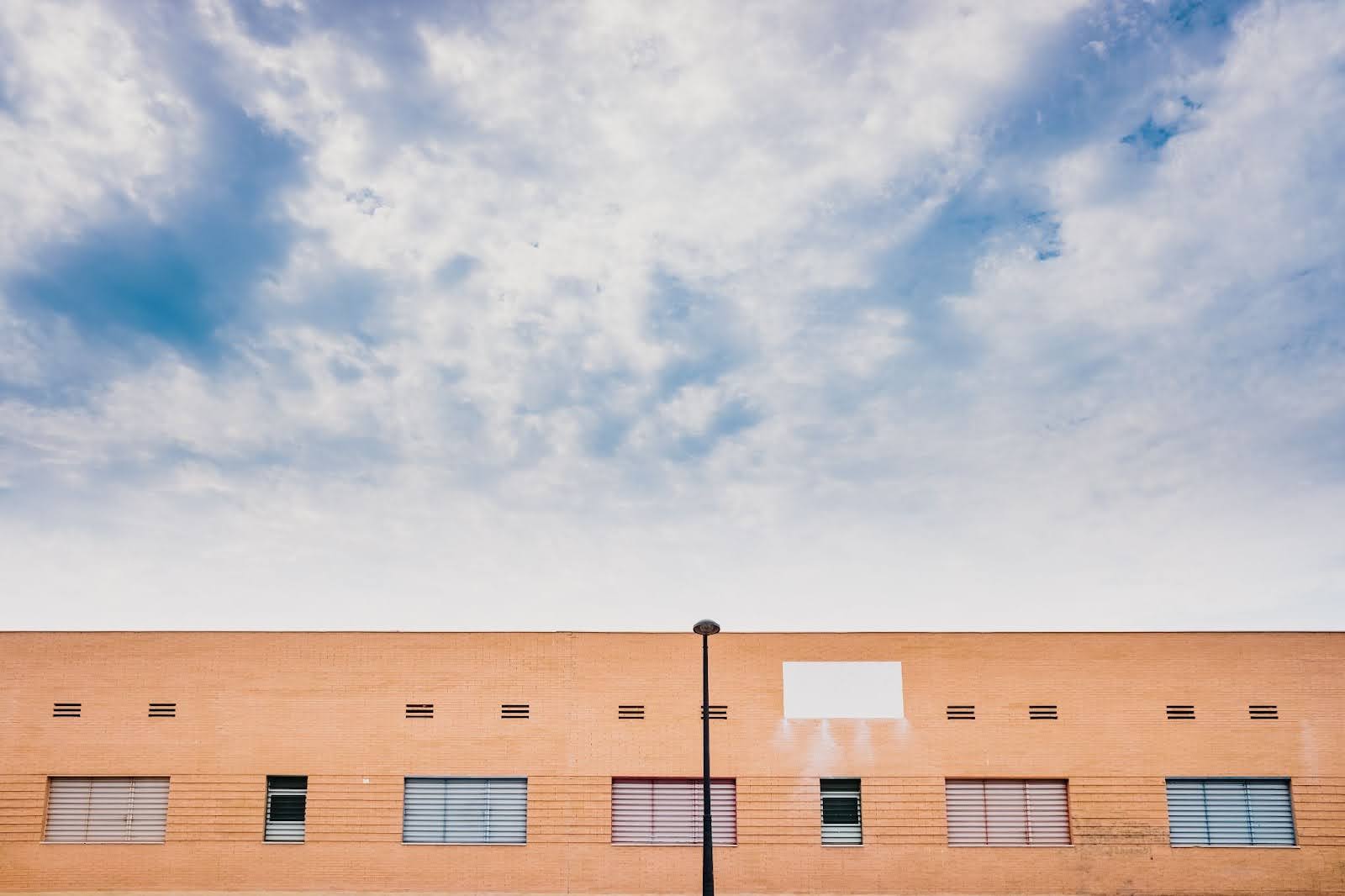
California Vacant Property Security
Vacant properties are known to draw the attention of unwanted visitors. This includes would-be criminals who want to vandalize your building or steal equipment, and squatters seeking to move in without your permission.
And for certain types of structures in California, it’s also unlawful to leave a property vacant without taking necessary security precautions.
Whether you own a vacation home, an unoccupied apartment complex, or an empty commercial building, here’s what every property owner should know about California vacant property security.
Why Do I Need Vacant Property Security in California?
Vacant property owners in California must comply with the state’s strict regulations and requirements. All property owners, including those with temporarily vacant properties, should know the laws and regulations in their region.
California Security Ordinances
Every county in California has its own rules, so be aware of your locality’s current ordinances.
For example, vacant property owners in Los Angeles are required to protect their property from vandalism and trespassing and prevent them from becoming a fire hazard or public nuisance. Under Los Angeles Municipal Code LAMC 98.0716, property owners who do not comply may face fines of up to $1,000 per day.
Throughout the state, regulations are subject to change at any time, and it’s up to property owners to stay abreast of the changes. Hiring security guards (who know the current regulations) to protect your property can help you remain in compliance with local laws.
Legal Liability and Property Management
Using security systems and guards to monitor your vacant property will not only help with property maintenance, it may also reduce your insurance premiums. Many insurance companies offer discounts on vacant property premiums if the owner uses professional security services, which can significantly reduce the risk of theft, vandalism, and liability claims.
Should an incident occur — such as a person getting injured while trespassing — you’ll have better protection from negligence lawsuits if you had well-documented security measures in place at the time.
Documentation of your security practices can prove that reasonable efforts were made to secure the property and deter unauthorized access. Security companies maintain documentation such as incident reports, surveillance footage, and patrol logs — all of which can be useful should you have to battle an insurance claim.
Safety Benefits of Hiring Security
In addition to remaining in compliance with local laws and potentially reducing liability premiums, having security measures in place offers a multitude of inherent safety benefits. Security systems:
- Deter criminal activity: Reduce the likelihood of vandalism, property theft, trespassing, squatting, drug activity, arson, and property destruction.
- Maintain access control: Access systems at entry points prevent unauthorized entry.
- Enable fast response to security threats: On-site guards are trained to react quickly if a security breach occurs.
- Improve emergency response times: During a security breach or emergency, security guards can contact law enforcement and emergency services for immediate assistance.
What Are Some of the Warning Signs You Need Security?
While all vacant properties can benefit from having security measures in place, not all need them. If you’re debating hiring security for your property, there are some strong warning signs to look for.
Indications that your vacant property is being targeted, rising crime rates in the neighborhood, and visible signs of attempted break-ins are all signs that it’s time to hire security.
Vacant Property Security Risks by Type
Any type of vacant residential, industrial, or commercial property can face potential threats and criminal activity, but some vacant properties in California are at much higher risk than others.
Construction Sites
- Risks: Construction sites are highly susceptible to vandalism, theft of equipment, and theft of high-value materials such as copper pipes, and leaving them vacant can expose you to legal liabilities if someone gets injured while trespassing.
- Solutions: The larger the site, the more important it is to hire security officers to protect your investment and prevent expensive legal consequences.
Properties Undergoing Renovations
- Risks: Like construction sites, vacant properties can attract vandals and thieves, but may also attract squatters looking to live in your property.
- Solutions: Protect your real estate investment with a security guard and CCTV cameras to prevent unauthorized people from loitering or living in your property.
Multi-Family Residences and Commercial Buildings
- Risks: Large vacant buildings like multi-family residences or commercial structures face threats from unauthorized access and various crimes.
- Solutions: Put security professionals on staff as a visual deterrent to prevent unauthorized access and prevent crimes from occurring.
Residential Homes Pending Sale or Under Foreclosure
- Risks: Homes under contract for sale or listed on the market shouldn’t be left empty for weeks or months at a time, as thieves, vandals, and squatters all pose serious risks.
- Solutions: At a minimum, install CCTV surveillance cameras that you can monitor remotely.
Vacation and Part-Time Residences
- Risks: Leaving your primary or vacation home unattended for a long time makes you susceptible to all sorts of property crimes, and you may have to contend with squatters who claim squatters’ rights, resulting in expensive legal battles.
- Solutions: Consider installing CCTV surveillance cameras to monitor your property remotely, especially if you don’t have nearby neighbors to regularly check on the home.
Properties Owned or Operated by Government Agencies
- Risks: Empty municipal buildings that are either not in use or under reconstruction face vandalism and unauthorized use.
- Solutions: Local governments are responsible for protecting these properties, including those under management of housing associations like Public Housing Authorities.
Read About: Top Security Threats to California Commercial Properties
What to Consider When Hiring Security Guards to Protect Your Vacant Property
Once you’ve determined you need security to protect your vacant property, think about the type of guards and systems you need. Also, consider what you want your overall security plan to look like.
Here’s a look at the top factors to consider.
24/7 vs. Part-time Security
Depending on the location of your property, you may need security guards around the clock or only during off-peak hours, such as nights and weekends. When you hire a professional security company, they’ll do a complete risk assessment of the property and surrounding area to recommend the level of security you need.
Armed vs. Unarmed Guards
All security guards in California are required to undergo professional security training programs and pass a test to obtain their state-licensed guard card. Armed guards have additional firearms training and are licensed to carry a weapon in the state.
Whether to hire armed or unarmed guards depends on the type of vacant property you own and how much crime occurs in the area.
Security Technology Needs
With or without the presence of physical guards, all vacant properties can enjoy the protection of a video surveillance system. Remotely monitored CCTV cameras are excellent crime deterrents.
In addition to CCTV surveillance cameras, consider leveling up security measures by installing other types of technology, such as:
- Smart alarm systems
- Glass break detectors
- Motion detectors
- Smart locks
- Access control systems
- Perimeter detection tech
On a large piece of land or a property with multiple buildings or units, consider installing multiple tech systems in different areas.
Emergency Procedures
Before hiring a security company, do your research to understand the specific protocols they have in place for handling threats, security breaches, and emergencies. For example:
- What are their incident response protocols?
- How do they coordinate with local law enforcement?
- What are their emergency contact procedures?
It’s critical to be aware of how your security guards will conduct themselves, especially if you’re far from the site or visit the property infrequently.
Learn More: What Are the Different Types of Security Guards?
Isn’t It Enough to Just Board Up My Vacant Property?
Boarding up your vacant property is a smart first step toward securing the building, but it shouldn’t be your only line of defense.
How Physical Barriers Help
Boarding does offer real security benefits and property protection by creating physical barriers at doors, windows, and other access points. This makes unauthorized entry more difficult and time-consuming, often deterring casual vandals and opportunistic thieves. It can also provide a degree of weather protection from storm and natural disaster damage, including water intrusion and debris.
But when it comes to boarding materials, steel or metal security barriers far outperform plywood. While plywood can be easily kicked in, pried off, or damaged by weather, steel barriers provide actual resistance to forced entry attempts. Steel barriers also create a more professional appearance and last significantly longer without deteriorating, making them more cost-effective despite higher upfront costs.
Why You Still Need Professional Security
Even the best steel security barriers have limitations that only professional security guard services can address.
Barriers are passive, which means they can’t respond to threats, contact law enforcement, or provide real-time monitoring. Determined intruders can still find ways around physical barriers and window guards if given enough time and tools.
Boarding also won’t prevent criminal activity outside of your building, such as illegal dumping. It also can’t detect emergencies like fires or gas leaks. The best approach is to combine steel barriers with a security team, giving you the benefits of both active monitoring and a physical deterrence.
How Much Does It Cost to Hire Vacant Property Security Guards?
Different factors affect the cost of security services in California, so the best way to know what you’ll need to pay is to get quotes from local security providers.
Keep in mind that no matter the cost, an investment in vacant property security can save money in the long run.
What Affects the Cost of Hiring Security?
The three biggest factors that impact the cost of hiring security are:
- Property size
- Location
- Threat level
Due to increased risk and insurance requirements, high-crime areas and larger properties requiring multiple guards command premium rates. You’ll also pay more per hour to staff armed guards rather than unarmed officers.
How Does Hiring Security Save Money?
A single break-in can cost a property owner thousands of dollars in damages and liability exposure. Investing in a security team, even if they only prevent a single incident per year, can cost you far less than running the risk of going without one.
Having on-site security guards and protocols in place also helps you avoid costly municipal fines and lowers the cost of insurance premiums. These also make it a more cost-effective option than forgoing security because you don’t want to incur the expense.
Check Out: The Beginner’s Guide to Hiring California Commercial Security Guards
How Can I Find Vacant Property Security Services in California?
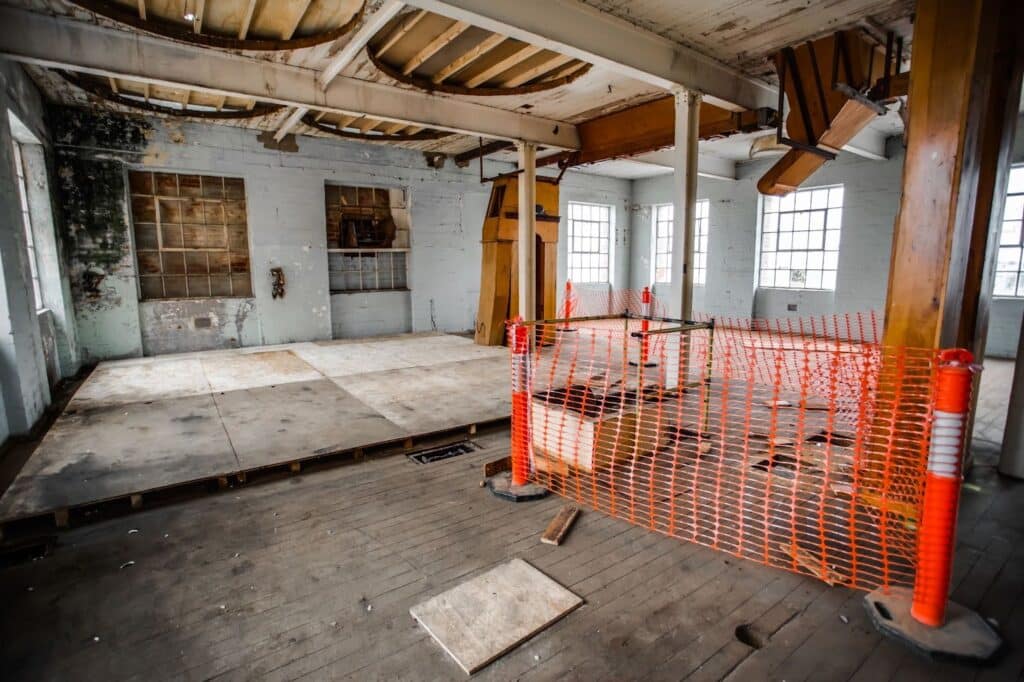
Once we receive your form, a member of our team will reach out to verify your information and connect you with a vetted, verified security team in your local area who can provide you with security solutions that will work for you.
Leaving a property unoccupied and unattended increases the risk of trespassers, vandals, thieves, squatters, arson, and all sorts of criminal activity. It also puts you at risk of violating local California ordinances and regulations, which can subject you to expensive fines and fees.
Before someone damages your property, injures themselves while trespassing, or decides that your vacant property is the perfect place to commit criminal activity, hire a professional security team to protect your investment.
To find top-rated security professionals in your California city, contact Security Explorer now.
Up Next: California Parking Lot Security: Benefits and Considerations
Read More
California Parking Lot Security: Benefits and Considerations
In California, parking lot security is essential. These vast, often dimly lit or publicly accessible spaces are vulnerable to everything from theft to assault. Thankfully, you can put security measures in place to ensure the safety of the people who park in your lot.
Here’s why parking lots and garages in California need special security solutions. We also share tips for hiring security guards and drafting a comprehensive security plan.
What to Know About California Parking Lot Security
From small outdoor lots to multi-level parking garages, all parking lots in California can benefit from security measures that prevent or minimize crime.
If you’re not already protecting your parking facility with a security plan, consider the threats that your lot may face and determine if your type of lot is at higher risk than others.
California’s Top Parking Lot Security Threats
Parking lot threats range from simple nuisances to deadly, violent crimes. Some of the most common security threats that parking lots face include:
- Vandalism and criminal activity
- Loitering and suspicious activity
- Vehicle break-ins and theft of valuables
- After-hours security threats to employees, customers, and the public
With security measures in place, you can prevent and deter would-be criminals from committing petty crimes like vandalism, property crimes like vehicle thefts, and violent crimes such as armed robberies and sex assaults.
Types of Parking Lots Requiring Security
All parking facilities face security risks, but some are at far greater risk than others:
- Shopping centers: The theft of vehicles or valuables within vehicles, and threats to customers and employees walking to and from their vehicles, are among the most common security threats in retail outlets.
- Construction site parking areas: Theft of valuable equipment and raw materials can create dangerous working conditions and render it impossible to complete projects on schedule.
- On-site parking facilities for businesses: Theft of vehicles and personal property are common risks for lots that service individual businesses, medical offices, banks, and office buildings.
- Multi-level parking garages with access control needs: The larger the lot and the more entry/exit points it has, the more susceptible it is to dangerous security threats and violent criminal activity.
Putting access control measures, video surveillance monitoring technology, and physical security guards in your parking facility can help prevent all these breaches from occurring.
You Might Like: Security Explorer Industry Report: California Crime Statistics
What Type of Security Do Parking Lots Need?
With so many security services available, parking lot owners often wonder what type of security is best suited for their lot. Here’s a run-down of some of the key considerations to make:
Security Guards vs. Security Officers
Security professionals have different roles and different levels of authority.
Armed or unarmed, security guards typically monitor and patrol, while security officers usually hold additional responsibilities, such as training guards and managing security operations. For standard parking enforcement, unarmed security guards are usually sufficient.
Mobile Patrol Services vs. Standing Guard Services
As the names suggest, mobile patrol services are on the move while standing guards are stationed at a particular location on the property.
Mobile patrol services offer real-time monitoring of the entire lot and are best suited for large parking areas and multi-level parking garages. Standing guard services provide an on-site security presence at lot entry points to help deter criminal activity.
Access Control
Some lots require only an access control system, which can be implemented through physical guards or key fob/key card access. Key fob and key card access points prevent unauthorized vehicles from entering the lot, but physical guards offer greater security by managing parking rules and enforcing parking regulations.
CCTV Integration
Every parking lot can benefit from surveillance cameras. High-quality surveillance technology supports security team efforts and helps deter and prevent criminal activity. Should a crime occur, CCTV footage can also be instrumental in helping law enforcement solve crimes.
Enhanced Security Measures
Unarmed guards are sufficient for most parking lots, but armed guards offer an added layer of security. Parking lot security can be further enhanced with K9 security teams composed of trained guards and trained dogs that work in tandem. Before hiring security for your lot, consider the pros and cons of hiring an armed vs. unarmed security guard.
Related: Pros and Cons of Hiring an Unarmed vs. Armed Security Guard
How to Create a Parking Lot Security Plan for California
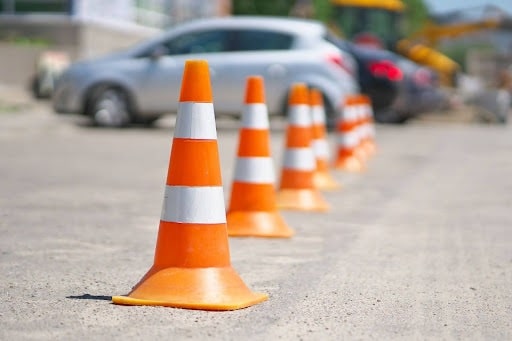
Patrol Services
Decide if you need mobile patrol officers or standing security guards. Standing guards are best for smaller lots with one main entry point, while mobile patrols are better for larger parking lots and multi-level parking facilities.
Lot Coverage
Some lots have 24/7 on-site security guards, while others hire part-time guards to work peak hours only. If you hire part-time guards, protect your lot with 24/7 CCTV monitoring to deter criminal activity when no guards are present.
Parking Enforcement
Think about what you want your guards to do. Some parking facilities hire guards to maintain access control, while others require them to provide parking passes, issue parking citations, arrange vehicle towing, and enforce parking regulations.
Security Team Requirements
Thinking about creating your own security team rather than hiring a professional security company? Be aware that all guards in California are required to undergo training and obtain a California guard card. Hiring professional guards who already have the required skills and licenses enables you to execute your security plan more efficiently.
FAQs: Parking Lot Security Guards
Do security guards in California need to be licensed?
All security guards in California are required to have a valid guard card. To obtain a guard card, security professionals must meet eligibility requirements, complete an extensive training course, and pass an exam that qualifies them to work as a security guard within the state.
What’s the difference between armed and unarmed security guards for parking lot security?
In addition to standard security guard training, armed guards also have firearms training. Unarmed guards are sufficient for most parking lots, but armed guards are best for parking facilities that are either high-value targets or located in high-crime areas.
Should I choose mobile patrol services or standing guards for my parking area?
With a smaller parking lot or garage that maintains robust access control at the entrance, standing guards may be all you need. Mobile patrol services that move throughout the facility are best for large lots, such as shopping center lots or multi-level parking garages.
How many guards do I need to hire to protect my lot?
The size, configuration, and location of your lot will determine how many guards you need. A professional security company can assess your individual needs and let you know how many guards it will take to best protect your lot.
Can parking lot security guards issue citations and arrange vehicle towing?
In private lots, security staff can issue citations for those who violate the parking rules. At the behest of a property owner or property manager, they can also request vehicle towing for cars that are unauthorized to park in the lot. However, only municipal parking tickets issued by law enforcement officials or the California Parking Authority are enforceable by law.
How much do parking lot security services cost in California?
The cost of security services in California varies depending on several factors, including your location, the number of guards you hire, any additional security measures required, and whether you need armed or unarmed guards. Costs can be anywhere from $20 to upwards of $200 per hour, depending on these factors.
Are background checks required for California parking lot security guards?
Yes. All guards in California must pass a fingerprint and background check to obtain the California guard card that allows them to work as a licensed guard in the state.
Check Out: The Beginner’s Guide to Hiring California Commercial Security Guards
Where to Find Parking Lot Security Services in California
Whether your parking facility is located in San Diego or Sacramento, Security Explorer is the easiest way to find security services in California. By connecting you with top-rated security guards in your region, Security Explorer takes the guesswork out of finding local security companies to meet your security needs.
To get started, fill out our simple online form with your contact information, location, and the type of security services you’re looking for. A member of our team will reach out to verify your information and connect you to a verified security firm in your area that can meet your security needs and keep your parking facility safe.
Maintain the safety of the customers, employees, and community members who park in your lot by putting robust security measures in place. With licensed security guards, access control systems, and CCTV monitoring, you can deter crime, prevent security threats, and keep your California parking facility safe around the clock.
Ready to hire parking lot security solutions in California? Visit Security Explorer now.
Read More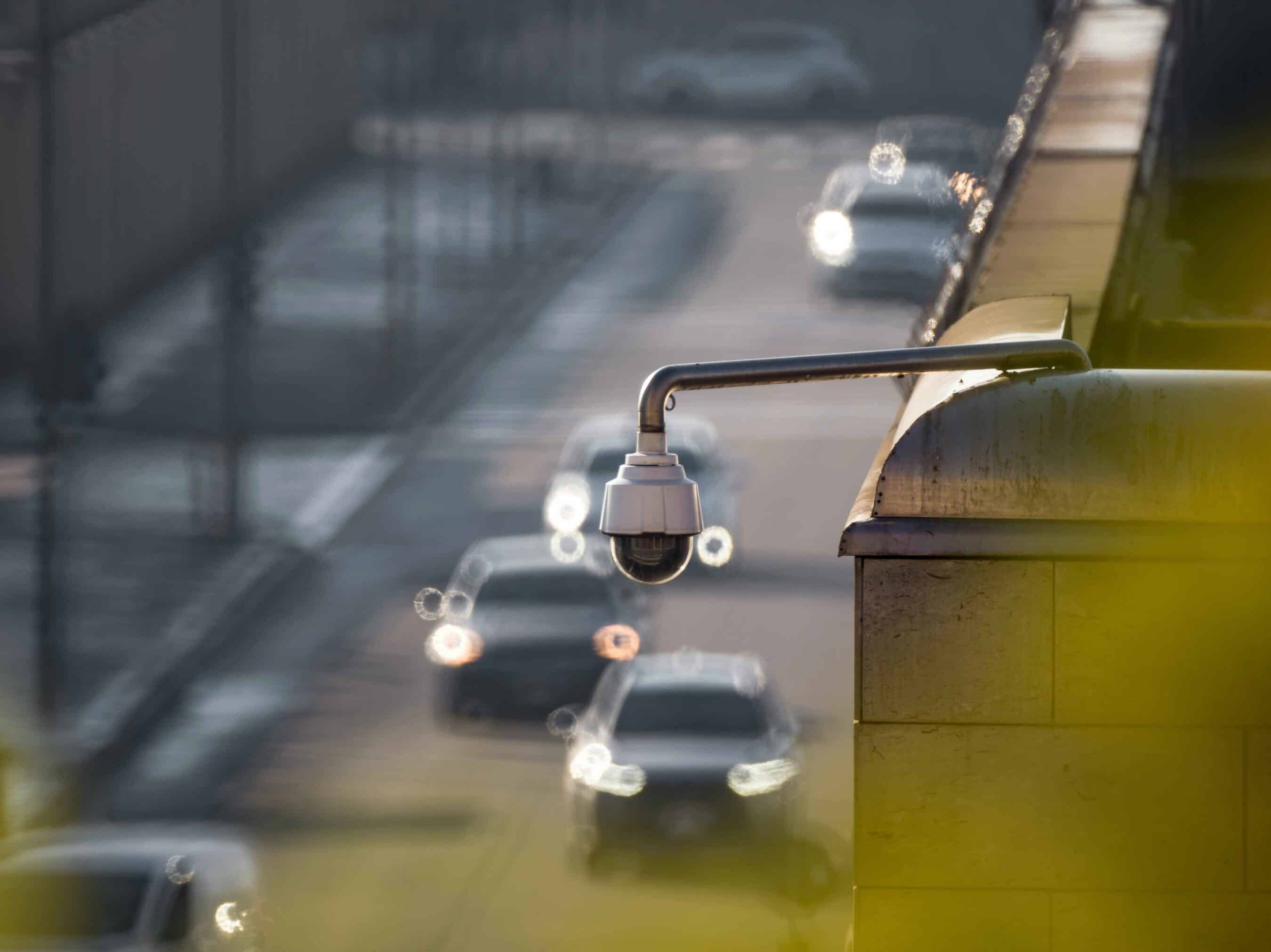
Top Security Threats to California Commercial Properties in 2025
Overview: Evolving Security Challenges for California Businesses in 2025
California business owners and property managers are facing a shifting security landscape in 2025. While overall crime rates in the state remain near historic lows (CalMatters analysis of FBI data), certain threats to commercial properties have surged and demand renewed attention. Organized retail theft rings, vandalism, homelessness-related trespassing, and large event crowds are testing the limits of traditional security measures. Recent legislative changes and regional crime trends are also reshaping how companies approach safety and private security services in California. In this report, we delve into the top security threats facing California commercial properties and discuss how businesses can mitigate risks using both armed and unarmed security, technology, and updated best practices.
Retail Theft in California: 2025 Trends and Business Impact
California retail theft incidents have spiked post-pandemic. Reported shoplifting rose 39% in 2023, reaching the highest levels since 2000. Commercial burglaries fell 9% in 2023 but remain above pre-pandemic levels. Source: California DOJ data via PPIC.

The surge is concentrated: Los Angeles ranked #1 worst city for organized retail theft in 2023, and the San Francisco–Oakland metro ranked #2, according to the National Retail Federation. Sacramento tied for #7. Four counties (Los Angeles, Alameda, Sacramento, San Mateo) accounted for 90%+ of the statewide increase. Businesses in these hotspots are turning to high-resolution surveillance, access-controlled entry, and on-site guards (often armed) to deter theft.
The financial impact is massive: U.S. retailers lost over $112 billion to shrink in 2022, with California stores a leading contributor. One example: an August 2023 Los Angeles “flash mob” looted a Nordstrom of roughly $300,000 in merchandise in under a minute.
State Response:
In 2024, California launched multiple anti-ORC initiatives. According Gov.ca.gov to Governor Newsom directed $267 million in grants to 55 police agencies to combat retail theft. The Organized Retail Crimes Task Force in Los Angeles and CHP’s Real-Time Organized Retail Crime Center are coordinating enforcement. AG Rob Bonta charged 22 suspects in a $1M dispensary burglary spree**.** The Legislature passed 10 new retail theft bills in 2024, and voters approved Proposition 36 in Nov. 2024 to toughen penalties for repeat theft.
Retail Response:
Luxury malls and high-risk retailers are adopting Armed Security in Los Angeles to deter ORC crews. Lower-risk sites may choose Unarmed Security in Orange County to maintain a welcoming atmosphere while increasing presence.
Vandalism and Property Damage: Costly Incidents on the Rise
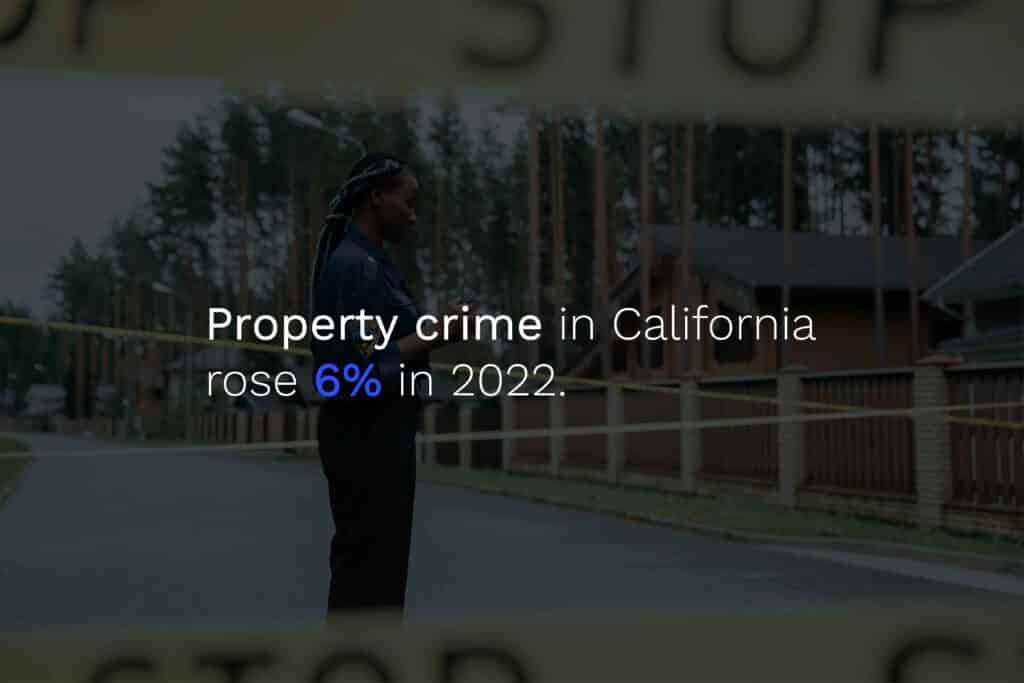
- Long Beach launched Visual Improvement Grants in 2023 to reimburse vandalism repairs after noting rising property crimes.
- Hemet offered small-business vandalism relief funds for broken windows and graffiti cleanup.
Prevention tactics:
- Environmental design: Anti-graffiti coatings, shatter-resistant glass film, and improved lighting.
- Surveillance & alarms: Visible CCTV and alarm signage deter opportunists.
- Private security patrols: Temporary security deployments during peak risk periods (holidays, civil unrest).
- Rapid cleanup: Immediate graffiti removal sends a “watched property” message.
Vandalism often precedes theft; a broken window today can be a burglary tomorrow. A visible security presence and prompt repairs lower your risk profile.
Homeless Encampments and Trespassing: A Sensitive Security Challenge
California’s homelessness crisis spills into commercial zones. Encampments by storefronts or in loading docks create trespassing, safety hazards, biohazards, and reputational issues. The legal landscape shifted with Grants Pass v. Johnson (U.S. Supreme Court, June 2024), allowing cities to enforce camping bans even if no shelter is available. Cities like San Francisco vowed to ramp up encampment removals.
The state is investing too: California awarded $130.7 million in Encampment Resolution grants in 2024, part of a $1 billion Encampment Resolution Fund clearing 12,000+ camps and moving ~20,000 people into shelter since 2021.
 Best practices for businesses:
Best practices for businesses:
- Consistent patrols & engagement: Early, humane interaction can prevent entrenched camps.
- Trespass affidavits & signage: File Trespass Letters of Consent with local police; post “No Trespassing” signs.
- Partner with outreach teams: Many BIDs use outreach specialists alongside security.
- Stay legal: Forced removal without due process risks liability. Cities often require storage of belongings and service offers during sweeps. Consult counsel for private-property protocols.
Balancing compassion and safety is key. Your policies should protect staff and patrons while respecting vulnerable individuals’ rights. Coordination with authorities (and documentation of issues) keeps you compliant and effective.
Event Security and Crowd Control: Safeguarding Large Gatherings
California’s return to large in-person events (concerts, conferences, sports) means crowd control and event security are critical again. The risks range from gate-crashing mobs and fights to active shooter or terror threats.
Look at Coachella 2023:
500,000+ attendees over two weekends, with over 10,000 staff members deployed (security, medics, support). Screening checkpoints, drones, on-site law enforcement, and rehearsed emergency plans are standard. Even so, each year sees fence-jumpers, medical emergencies, and altercations. This is proof that security must be as robust as the show.
For corporate events and smaller festivals:
- Access control: RFID wristbands, digital ticketing, staffed chokepoints.
- Visible security: Mix of uniformed guards and plainclothes officers; armed teams for high-risk events.
- Surveillance & comms: CCTV, drones, interoperable radios among guards, staff, and responders.
- Emergency action plans: Evac routes, medical tents, stop-show protocols, staff briefings.
Local codes (fire, occupancy) and post-pandemic health rules add layers of compliance. Regional nuances matter: protests in LA/SF, beach events in OC, stadium brawls statewide. Our directory includes specialists in Event Security in Orange County and beyond.
A secure event protects both people and brand reputation. With California hosting global spectacles like the 2026 FIFA World Cup and 2028 Olympics, expectations for event safety are soaring.
Armed vs. Unarmed Security Guards: Choosing the Right Protection
Should you hire armed or unarmed guards? The answer depends on threat level, environment, and liability tolerance.
Armed Security Guards
Licensed to carry firearms, they undergo extensive firearm and use-of-force training. Many are ex-military or law enforcement. An armed presence deters violent crime (banks, jewelry stores, cannabis dispensaries). In active shooter or armed robbery scenarios, they can respond immediately.
Tradeoffs:
Higher hourly rates and insurance premiums, increased liability, and potential customer unease. Armed force incidents face intense scrutiny. Reserve for genuinely high-risk sites and hire highly vetted professionals.
Unarmed Security Guards
They offer deterrence, observation, de-escalation, and emergency response without firearms. Ideal for customer-facing environments where a friendly presence is preferred. They’re cheaper, require less insurance, and still manage access control, CCTV monitoring, escorts, and incident reporting. Limitation: they cannot neutralize armed threats; they rely on verbal skills and calling police.
 Decision factors:
Decision factors:
- Threat & crime data: High-crime area or high-value assets? Armed may be justified.
- Business type & clientele: Family retail vs. cash-heavy dispensary.
- Legal & insurance: Ensure BSIS guard cards and firearm permits; confirm coverage.
- Tech support: Radios, panic buttons, body cams enhance both armed and unarmed teams.
Many properties layer security: unarmed guards for daily presence, armed quick-response units for escalation.
Regulatory and Legislative Updates Affecting Private Security (2024–2025)
Stay current on laws shaping security operations:
- SB 1454 (2024) – Effective Jan 1, 2025. Expands BSIS oversight to proprietary (in-house) security teams. Formerly exempt nonprofits/churches must now register in-house guards and meet training requirements. Unlicensed security work is now an infraction. If you employ in-house guards, budget for guard cards, training, and compliance.
- Retail theft bills (2024) – e.g., AB 1708 reinstates felony options for serial shoplifters (aggregate theft >$950) and criminalizes possession of theft tools. CHP launched a Real-Time ORC Center. Retailers should tighten evidence capture (video, reports) to aid prosecution.
- Proposition 36 (2024) – Voter-approved rollback of parts of Prop 47. Tougher penalties for repeat property crimes and drug offenses, enabling felony charges for serial theft or ORC-linked thefts even under $950. Document incidents and coordinate with law enforcement; prosecutors have new tools.
Other ongoing rules: every guard must be BSIS licensed; armed guards need firearm permits and requalifications. Guards operate under private person’s arrest authority and must promptly hand suspects to police. Some cities (e.g., San Francisco nightlife, Los Angeles alarm permits) have extra requirements.
Privacy & tech:
California’s [**CCPA](https://oag.ca.gov/privacy/ccpa#:~:text=Updated on March 13%2C 2024,personal information collected about them.)/[CPRA](https://thecpra.org/)** affects camera footage and data retention. If using facial recognition, note cities like San Francisco ban it for police; private use is legally gray and contentious. Post signage and set retention policies.
Review your security program with counsel or a consultant after new laws take effect. Compliance improves effectiveness and reduces liability.
Conclusion: Proactive Security Planning for 2025 and Beyond
California commercial properties face myriad security threats in 2025, but none are insurmountable. Retail theft and ORC demand hardened targets and tight law enforcement coordination. Vandalism and petty crime require vigilance and quick remediation. Homelessness near properties poses legal and ethical challenges best handled with compassionate, lawful strategies. Major events require meticulous security planning. Choosing between armed and unarmed guards comes down to risk assessment and context.
The theme is proactivity. Audit your risks now: local crime trends, physical safeguards, staff training, customer safety perceptions. Build a layered plan—modern alarms/cameras, reputable security patrols, and clear emergency procedures. California offers a robust ecosystem of security firms and tech vendors.
Read More
The 7 Skills of a Top-Tier Security Guard Manager
Security guard managers are in high demand, but what separates a successful leader from one who simply holds the title?
While hard work, training, and technical expertise provide the foundation, it’s also soft skills — communication, leadership, and ethics — that determine how well a manager can guide and motivate their team.
If you want to pursue a career in the security industry, here’s a closer look at the seven security manager skills you need to succeed, with tips for mastering every skill.
Start Here: Must-Have Security Manager Skills
As with any supervisor in any career, security guard managers need a specific skill set to do the job, beginning with on-the-ground industry experience and technical expertise.
Skill #1: Industry Knowledge and Experience
You can’t effectively lead what you haven’t done yourself. Practical security guard experience is essential not only for managing a team, but also for building credibility.
When looking at security manager job descriptions, you’ll notice they often include these core requirements:
- A bachelor’s degree in criminal justice
- A law enforcement or military background
- Prior experience working as an entry-level security officer
Different employers may have different or additional requirements, but completing a professional security guard training program (and holding a security guard certification, if you’re in a license-only state like California) tends to be standard.
Browse recommended security guard manager services in popular destinations:
Security guard manager services in Los Angeles | security guard manager services in Sacramento | security guard manager services in San Francisco
Making It Happen
Tips for developing your knowledge and experience of the security industry:
- Pursue formal training. Complete security guard training and continuing education to develop your professional experience.
- Stay abreast of best practices in the security industry. If you plan to work in a niche security sector, such as event, fire watch, or K9 security, you’ll also need any related specialty knowledge.
Skill #2: Mastery of Security Technology
Security systems expertise is a baseline skill for security managers. You can’t manage security operations if you don’t understand the technology that supports them.
For example, security managers who protect commercial properties, residential properties, or industrial facilities must know how to operate and maintain access control systems, alarm systems, and CCTV monitoring systems.
Similarly, cybersecurity managers must undergo intensive training to understand the proper detection and prevention of cyber threats.
Making It Happen
Here’s how to develop your technical expertise:
- Pursue formal training and hands-on experience. Obtain industry certifications like CPP (Certified Protection Professional) or PSP (Physical Security Professional), and enroll in manufacturer-specific training programs from companies like Honeywell, Bosch, and Hikvision.
- Get practical experience. Shadow security technicians during routine system checks, or volunteer for system installations, maintenance, or upgrades at your workplace.
- Stay current. Join professional associations like ASIS International for access to technical workshops and networking with systems experts. Subscribe to industry publications like Security Management Magazine and SecurityInfoWatch, and follow security technology vendors on LinkedIn for product updates.
- Seek out opportunities to work directly with different systems. Request cross-training assignments, attend trade shows to interact with new technology, and build relationships with your organization’s technology vendors who can provide ongoing education and support.
Related: Security Guard Training: How to Get Certified and Level Up Your Security Services Today
When Things Get Real: Managing Security Under Pressure
As a security guard manager, situations can become dangerous in an instant. The best security guard managers have the skills it takes to make good decisions under intense pressure.
Skill #3: Preparing for the Worst While Hoping for the Best
A security professional’s job isn’t to assume the worst will happen, but to prepare for it.
Managing security operations means understanding risk assessment. In other words, knowing how to:
- Anticipate and identify vulnerabilities
- Perform proactive security risk assessments
- Develop detailed security strategies to improve overall security measures
All of the above require strong security awareness and instincts. In other words, you need to master how to think and plan ahead if you want to lead a team that successfully prevents potential security breaches.
Making It Happen
Use these tips to improve your risk assessment abilities and mindset:
- Practice threat modeling exercises. Regularly walk through your facility or review your systems, asking “What could go wrong here?” and “How would someone exploit this?”
- Analyze real security incidents. Focus specifically on how vulnerabilities were exploited to improve your threat identification skills.
- Conduct regular security audits. Schedule monthly walkthroughs of your premises, reviewing everything from physical access points to procedural gaps.
- Engage in scenario planning. Run “what-if” exercises with your team, discussing response strategies for various emergency situations.
Skill #4: Crisis Management and Keeping Cool
Should a security threat occur, you need to know how to handle the situation — and that means keeping your cool. Crisis management is necessary to keep people safe, and you must have incident response and emergency response plans in place to manage a crisis should one arise.
A crisis could be anything from a medical emergency to an armed robbery to a natural disaster. Security managers need real-world problem-solving and crisis management skills to guide their teams, ensuring everyone understands the protocols.
Making It Happen
Take a look at these proven strategies for building your crisis management skills and training your team to respond:
- Regularly test your emergency response plans. Conduct quarterly emergency drills for different scenarios (fire, lockdown, medical emergency) and time your team’s response.
- Set clear communication protocols. Define who reports to whom during emergencies and ensure everyone knows their role before a crisis hits.
- Run post-incident reviews. After every emergency (real or simulated), gather your team to discuss what worked, what didn’t, and how to improve response times.
Skill #5: De-escalation and Conflict Resolution
One of a security guard manager’s primary responsibilities is knowing how to spot and de-escalate potential threats.
Threat mitigation is key to keeping people and properties safe. As a security guard manager, it’s incumbent upon you to help every member of your team develop this unique skill as well.
Making It Happen
Develop your de-escalation and conflict resolution skills with these practical exercises:
- Stage de-escalation scenarios. Role-play different confrontational situations, focusing on a variety of verbal and non-verbal calming strategies.
- Review case studies. Read about successful and failed de-escalation attempts, identifying the verbal techniques and body language choices that led to positive or negative outcomes.
- Practice in the mirror. Work on maintaining calm facial expressions, open body posture, and a controlled vocal tone while rehearsing de-escalation phrases. Practice looking confident but non-threatening, and work on keeping your hands visible and movements slow and deliberate.
- Learn from the experts. Study de-escalation tactics and techniques used by mental health professionals, social workers, and hostage negotiators.
You Might Like: What Are the Different Types of Security Guards?
Interpersonal Skills: Leading a Security Team

Skill #6: Communication and Active Listening
Written and verbal communication skills are important for almost any career path. They’re also core leadership skills for anyone who wants to work in management.
However, effective communication isn’t just about speaking and writing clearly. You also need to be skilled in active listening.
Security managers must listen to understand, not just to respond, when fielding concerns from team members and gathering critical information during incidents. The ability to truly hear what others are saying often makes the difference between resolving issues quickly and letting small problems escalate into major ones.
Making It Happen
Here’s how to strengthen your written communication skills:
- Master clear email communication. Write concise subject lines, use bullet points for complex information, and always include specific next steps or deadlines when requesting action from your team.
- Create user-friendly security contracts. Use plain language instead of jargon, break down complex procedures into numbered steps, and include visual aids or diagrams when explaining security protocols.
- Maintain high incident report standards. Document events immediately while details are fresh, stick to observable facts without personal opinions, and ensure your reports tell the complete story from start to finish for legal and insurance purposes.
Tips for developing stronger verbal communication skills:
- Practice active listening. Focus on understanding before responding, ask clarifying questions to ensure you’ve grasped the full message, and avoid interrupting team members even when you think you know what they’re going to say.
- Seek regular feedback on your communication style. Ask trusted colleagues and team members how clearly you explain instructions, whether your tone comes across as intended, and if there are areas where you could be more effective.
- Join professional speaking organizations. Consider groups like Toastmasters to practice public speaking, learn to organize your thoughts clearly under pressure, and develop confidence when addressing your team or presenting to management.
Skill #7: Ethics, Integrity, and Professional Standards
Whether you’re tasked with establishing new security policies or following existing protocols, ethics and integrity are non-negotiable if you hope to advance your career.
Security managers may face several common ethical dilemmas, including but not limited to:
- Balancing client and stakeholder needs with legal obligations
- Handling confidential information in an appropriate manner
- Managing conflicts of interest with vendors or contractors
- Making tough calls about employee misconduct
Without integrity and unshakeable professional standards, security managers may struggle to address these tough situations.
Making It Happen
Strengthen your ethical and professional standards with these practical approaches:
- Join professional associations with strong ethical codes. Organizations like ASIS International provide established ethical frameworks, continuing education on professional standards, and resources for navigating complex moral decisions in security management.
- Seek mentorship from respected industry leaders. Connect with experienced security managers who have faced similar ethical challenges, ask them how they’ve handled difficult situations, and learn from their decision-making processes.
- Create a personal ethical code. Take the initiative to define and write down your professional boundaries and decision-making criteria, giving yourself ethical guidelines to rely on when facing high-stakes situations.
To thrive as a security guard manager, you need the right balance of hard and soft skills.
Start by reviewing security manager job postings that interest you and looking for patterns. Most, if not all, security management jobs require industry experience, professional education, and hard skills like knowledge of the latest security technologies.
Don’t forget to work on your soft skills like verbal and written communication, threat de-escalation, maintaining calm under stress, and holding yourself to a set of ironclad ethical and professional standards.
All of the above will make you a stronger leader — and with great leadership, the guards you manage and the people you’re hired to protect will be safer and more secure.
To learn more about the industry and the different types of security guards that you can train to be, visit Security Explorer’s resources page now.
Up Next: How to Win More Security Contracts for Your Security Company
Read More
How to Write a Security Guard Incident Report [Examples Included]
Like all members of law enforcement, security guards have the important task of writing incident reports. Incident reports document all essential information related to a security breach or out-of-the-ordinary event, and to be a great security pro, you’ll need to know how to write a detailed, thorough report.
Here’s how to write a security guard incident report, from best practices to common mistakes to avoid. We also include examples of good incident reports.
Why Security Guard Incident Reports Must Be Clear and Accurate
In a security incident report, accuracy is everything. Incident reports are used for many reasons, including follow-up after incidents, legal purposes should an incident result in a criminal arrest or civil lawsuit, and training new guards on how to do the job.
As a new security guard, it’s imperative that you know how to write incident reports and how to gather information during and after an incident to make the report as clear, accurate, detailed, and informative as possible.
What to Include in a Security Guard Incident Report
Security guard incident reports contain several sections. Every section is critical to the reporting process when documenting an incident and detailing the chain of events.
What Does a Security Guard Incident Report Look Like?
Every incident report should start with the name of the security officer who investigated and wrote the report, as well as the date, time, and location of the incident.
Basic Structure
Incident reports have a specific structure and can include blank lines or spaces for filling in the necessary details.
For guards who monitor outdoor or exterior areas, an incident report may include a blank space to fill in the address, intersection, or precise location.
For guards who monitor indoor spaces, the report may include a checklist of areas within the building, such as the reception area, second-floor bathroom, break room, and garage bay.
Incident reports also include sections for:
- Writing a brief summary and overview of the event
- Describing the incident in greater detail
- Detailing any damage that occurred
- Listing the names and contact numbers of those involved, including witnesses
- Detailing any follow-up actions you took or any follow-up plan you intend to do
Incident Report Details
The difference between a good incident report and a great incident report comes down to how much detail you include.
Date, time, and location
These basic details are critical and must be 100% accurate. When writing a report, double-check your watch or phone to confirm the time and make sure you note the precise location and address.
List of all parties involved
Be sure to list every person involved, including victims, assailants, witnesses, and any other guards who were present at the time. Include each person’s contact information, if known. If it’s not necessary to bring in law enforcement for follow-up, obtain witness statements as well.
Incident description
Write a thorough and detailed description of what occurred. State what you personally saw and heard, as well as what witnesses reported. When describing your own account, stick to the facts you know rather than inserting any conclusions you personally drew from what you observed or what others said.
Your follow-up actions
Detail any steps you took during and after the incident. Include whether you contacted law enforcement for additional assistance or if the incident was managed on site without the need for the police. Detail every action you took and explain why you took that action, including whether first aid was rendered and if your interactions ended when police, EMTs, or other first responders arrived.
Next steps
Include all of your next steps and the follow-up actions you plan to take after the event. This may include contacting your supervisor, contacting police, and discussing the incident with other guards to determine how to better handle such an incident in the future.
Examples of Great Security Guard Incident Reports
Experienced security guards know how to write great reports, but even rookie guards can excel at this part of the job if provided with standardized, easy-to-read report templates.
Use this Security Guard Incident Report Template to help you get started.
Related: Security Guard Training: How to Get Certified and Level Up Your Security Services Today
Best Practices for Writing an Effective Incident Report
Top-notch security personnel know how to write effective, detailed reports. Here are some important things to keep in mind when documenting your next incident.
Be Objective
Don’t interject personal opinions or discuss what you think might have happened. Detail only the facts that you know occurred.
Include Everything
While you’ll want to streamline your incident report to include just the facts, it’s important not to miss any relevant details. Be sure to document all incident details, including the sequence of events and the full names of the involved parties.
Use Simple Language
Be direct and honest without elaborating or documenting any unnecessary information. Incident reports should be straightforward and describe the incident as clearly as possible to someone who wasn’t there.
Check for Accuracy
Proofread your report and double-check that the specific details are accurate before taking any next steps.
Fill Out the Complete Report
Security companies often use standardized incident reports. When using a standard form, fill out every section and be careful not to leave anything out. It’s also best to fill out the complete report right after the incident, before your memory fades.
Keep Records
Keep all incident reports on file. Even if they’re not required for court proceedings or legal actions, incident reports can be useful in helping you understand patterns across similar incidents, identify vulnerabilities requiring better security, improve security measures, and reduce the risk of future incidents.
Strong reporting skills are just one part of effective leadership — explore the full range of skills every security manager needs to handle incidents, lead teams, and advance in your security career.
You Might Like: What Are the Different Types of Security Guards?
Common Mistakes to Avoid When Writing Incident Reports
For new security guards, perfecting the art of writing an incident report can take time. Keep these tips in mind to improve your report-writing skills.
Using Vague or Unclear Language
Choose your words wisely and be as specific and clear as possible. The goal is to make it easy for someone who wasn’t present at the incident to have a clear understanding of what took place.
- Wrong: “A situation involving some people happened.”
- Right: “Two male subjects, between the ages of 25-30, had a verbal altercation.”
Including Personal Opinions or Assumptions
It’s fine to form your own opinion about an incident, but that opinion does not belong in an incident report. Include all facts but leave out personal opinions or assumptions.
- Wrong: “The suspect was probably intoxicated and acted crazy.””
- Right: “The subject displayed unsteady movement, slurred speech, and smelled strongly of alcohol. They raised their voice and made threatening gestures.””
Not Documenting the Time Sequence
Always explain the events in chronological order and note specific timestamps as much as possible. No matter the length of the event, document the timeline from beginning to end.
Leaving Out Witness Info
Eyewitnesses can be critical, so be sure to obtain their full names, verify their identification, and record their contact info, including phone numbers and addresses.
Not Documenting Your Own Actions
Don’t forget to explain what you did as the security professional on duty. Document your observations and movements, when you did them, and why you did what you did.
Waiting Too Long to Write the Report
Write incident reports as soon as possible, preferably within a few hours of the incident, when the details are still fresh in your mind.
Skipping the Small Details
Small details can make a big difference. It can be helpful to note things that may seem inconsequential, such as the weather, the lighting, and the number of bystanders.
Using Security Jargon
Write the report so that anyone who reads it, including non-security professionals, can understand it.
Forgetting to Proofread
Spelling errors and typos can undermine your credibility and professionalism. Take a few moments to proofread your report and make sure it’s error-free.
Leaving Blank Sections
If a section doesn’t apply, write “N/A” for not applicable rather than leaving a line empty.
Discussing the Incident with Others Before You Write It
Talking about the incident with others can influence your memory. Make sure you write the report first, then discuss it with your supervisors or coworkers if necessary.
Writing a proper incident report is a skill all security professionals must learn. No matter where you are in your security career, taking the time to perfect this skill can help you provide a better level of security to those you serve and help you level up your professional services at the same time.
Learn more about how to boost your security services by visiting Security Explorer now.
Up Next: The Ultimate Guide to Hiring Residential Security Guard Services in California
Read More
Digital Marketing 101 for Security Companies
Introduction
So, you’ve launched a small business security company—congrats! You’ve done the legwork: hit up networking events, squeezed every referral dry, and plastered the neighborhood with slick yard signs. But now you’re facing the next big question: how do you go digital, scale fast, and rise above the noise in today’s crowded, hyper-connected market? Is it even possible?
Short answer: Yes. Visibility equals credibility. And if you’re in the business of protecting people, it’s time to protect your own visibility, right where your clients are looking first: online.
Whether you’re new or ready to level up, we’ll show you how to boost your presence with a smart mix of organic and paid digital marketing strategies—from Google and social media to powerful platforms that connect you with potential customers already searching for your services.
Why Digital Marketing Matters for Security Service Providers
Some stories really do end in happy ever after—like this one about a mid-sized security company that built a solid business with old-school security marketing: cold calls, walk-ins, and word-of-mouth. Their website? Collecting digital dust, quietly ignored while the leads kept coming—until they didn’t.
So, they hired a marketing agency to launch an effective marketing plan that covered all the bases: optimizing their Google Business Profile, upgrading their website, building a social media presence, and running targeted ads on Google and Facebook to reach both active searchers and prospects.
Soon, that digital makeover turned into a lead-generating machine. But then came the jaw-dropper: a 300% spike in new client signings within 3 months. The magic wand in this fairy tale was the power of high-quality digital strategy.
But here’s the less glamorous part of the story: That growth surge also reveals just how many leads were missed. For months—maybe years—new leads and potential new customers were searching and finding other businesses. As they say, “Your competition is just one click away.”
Back to the good news: Security companies already have the local edge, and digital marketing, especially local SEO, can take it even further. Nearly 80% of U.S. consumers search for local businesses online every single week. Many do it daily.
And the best part? Whether you start with free tools or invest in targeted ads, you can see results quickly with the right strategy. Let’s break down the core components of a smart, simple digital strategy for security company marketing.
1. Google Business Profile: Your Digital Front Door
If there’s just one thing you take away today—one simple action that instantly improves metrics, builds credibility, boosts visibility, and connects your business across the web—it’s this: set up a Google Business Profile (GBP).
It’s a powerful tool that’s free, fast, and ridiculously effective at getting small businesses in front of high-quality leads.
Picture this: A local school principal types “school security services near me” into Google. If your profile is set up right, your business could appear in the map results, complete with reviews, hours, contact info, and services. That’s not just visibility—it’s real-time lead generation.
Now multiply that one search by thousands, because searches like this have skyrocketed 900% in just two years.
How to Set Up Your GBP:
- Create or Claim Your Profile. Head to business.google.com and search for your business name. Google may have automatically created one for you—if so, claim it. If not, create one from scratch and fill in your business details.
- Don’t Skip your NAP (Name, Address, Phone Number). Make sure your basic info is accurate and consistent everywhere online. Nearly 2 out of 3 customers say they’ll avoid businesses that have incorrect or conflicting contact details.
- Mark Your Territory. Select the right category (e.g., Security Guard Service), list service areas, and highlight key offerings, credentials, and specialties.
- Start Collecting Reviews. A good review is a free endorsement; a bad one is actionable feedback. Either way, respond professionally with a personalized message—less than half of consumers would consider a non-responding business, while 88% say they’re more likely to use a business that replies to both positive and negative feedback.
Think of your Google Business Profile as the Yellow Pages of the digital age—only now, it’s clicks doing the walking and sending customers your way.
2. Your Website & Local SEO: Your Lead Magnet
In the world of digital marketing, they say your website is the front door to your business—but in reality, it’s your 24/7 red carpet, your first handshake, and your MVP all rolled into one.
Let’s say a potential customer finds you through your GBP and is curious to learn more. The very next click? Your website. But if what they find is outdated, cluttered, or worse—nonexistent—that warm lead can go cold in seconds.
What Makes a Great Company Website?
- User-Friendly Web Design & Easy Navigation. Make it easy for people to find what they need. A simple, clutter-free layout with easy navigation equals happy visitors.
- Clearly State Services. List your services and explain what you offer. Highlight what makes your business different.
- Trust Signals. These are testimonials, client logos, certifications, and licensing badges—things that boost credibility and help reassure potential new clients that you’re the real deal.
- Technical Performance. Your site should be fast, mobile-friendly, and secure—think of it like a well-oiled patrol vehicle: dependable and efficient.
Optimize Your Website for Local Search
Your website is only half the battle. Search Engine Optimization (SEO) really takes things up a notch by helping your business appear in search results when people are actively looking for the services you offer.
As we touched on earlier, today’s customers tend to prefer businesses in their own area, making local SEO even more powerful.
Take the same example: A school administrator searching “best school security company near me.” If your site is optimized, you could show up right on the first page—maybe even in the top three (a.k.a. the Google 3-Pack). That means more clicks, more calls, and more contracts.
In fact, SEO has revolutionized digital marketing for small businesses. It’s the engine behind some of the highest marketing ROI:
- About 25% of business website traffic comes from local search.
- Nearly 50% of companies say local SEO gives them the best ROI.
- Searchers often have high intent—they’re ready to hire.
Steps to Improve Your Website and Local SEO
- Optimize Your Website Content. Use tools like Semrush to find relevant keywords—terms people search when looking for services like yours (e.g., “event security in (city name)”).
- Capitalize on Your Local Market with Location Keywords. Use keywords naturally in your content (e.g., “Proudly serving San Diego and Los Angeles”). Avoid repeating or stuffing them in awkwardly.At the end of the day, your content should be written for real people, not just search engines.
- Publish Helpful Content. Posting a blog consistently builds authority and boosts SEO. Try topics like “Pros and Cons of Hiring an Unarmed vs. Armed Security Guard” or “Event Security Basics.” These naturally include industry keywords and attract the right visitors, increasing traffic and better rankings over time.
A great website plus smart local SEO turns curious clicks into serious clients. And best of all, it helps you look like a trusted professional from the moment you show up in a search.
3. Social Media Presence: Build Trust Where It Matters
Social media and business haven’t always gone hand in hand, and getting your team to jump on viral trends might not seem like a natural fit for a private security firm. But with the right platform and smart execution, social media marketing can be one of the best ways to build brand awareness, local trust, and professional credibility.
In fact, 83% of small business owners use Facebook, and nearly 30% are on LinkedIn. Your next client is probably already scrolling—you just need to show up.
Facebook: Build Local Trust and Visibility
Think of Facebook as your digital neighborhood watch board. When someone posts, “Any good security companies in town?”-you want your business to be the one people tag without hesitation.
What to Do:
- Create a Business Page. Set up your profile with clear details: contact info, service area, logo, and preferably, logos and images.
- Invite Your Network. Ask friends, staff, and happy clients to follow your page.
- Post Consistently and Maintain a Personal Touch. Posting regularly is more important than posting often with hiatuses. Share helpful tips, behind-the-scenes content, and community updates.
- Engage with Comments & Groups. Invite discussions. Answer questions. Thank reviewers. Join local groups (where allowed) and offer helpful advice, not sales pitches.
LinkedIn: Build Your Professional Credibility
LinkedIn is where the decision-makers hang out: school administrators, property managers, event planners, and business owners. To “LinkedIn” is not to sell but to build partnerships and position your firm as a qualified, reliable partner.
What to Do:
- Set Up a Company Page. Add a clean logo, a sharp banner image, and a clear overview of what you do, highlighting specializations.
- Tap Into Your Team’s Network. Encourage staff to update their job titles and follow your page. When they’re active, your brand gets more exposure.
- Engage Like a Pro. Reply to comments. Congratulate others on their milestones. Add comments on group pages.
With social media, consistency is key. One well-managed Facebook or LinkedIn page beats three neglected ones. Show up, stay active, and let your digital presence do some of the heavy lifting.
4. Paid Advertising: Instant Visibility
Although building organically is a solid long-term strategy, it does take a little patience. But with paid local advertising, you’ll skip the line with no rules broken.
Platforms like Google and Facebook are a surefire way to generate leads and boost profit, which is probably why 94% of small businesses say they plan to increase or maintain their digital marketing budgets.
There are many options available. Among them, Google Search Ads targets audiences actively looking for security services, while Facebook Ads place your business in front of those who may not be searching yet, but fit the profile of potential clients. Between the two, you’re off to a solid start.
Google Ads: Being at the Right Place at the Right Time
Google Ads helps you show up at the top of search results right when someone’s ready to hire. If someone types “hire security guards” or “event security near me,” boom—your marketing campaign can be the first thing they see. These text-based ads are powerful because they’re triggered by specific search terms like “mall security” or “private guard service near me.”
The catch? Cost. Google works on a pay-per-click (PPC) model, and security-related keywords can range from $4 to $10 per click, depending on your area. But do the math: if one $5 click lands a $2,000 contract, that’s a strong return on investment.
A Few Key Steps:
- Use Google’s free Keyword Planner to see what people are searching for.
- Start small—even $10/day can go a long way if you’re strategic.
- Use geo-targeting to focus your ads on the right demographics in your local service area.
- Write clearly, make it compelling, and keep it concise. Content is still king, so make sure your copy sounds trustworthy and professional.
Facebook Ads: From Scroller to Sale
Facebook Ads don’t wait for people to search—they find the right audience and show up right in their feed. Unlike search ads, Facebook ads target people who match your ideal customer profile and slide into their feeds, so your ad pops up while they’re scrolling.
Here are a few potential leads you can target with Facebook Ads:
- Neighborhood watch coordinators for your patrol services.
- Property managers overseeing multiple buildings.
- Local small business owners—before they even realize they need security.
Getting started:
Keep it simple: Use a clear, friendly photo of your team with a sharp headline like “Trusted Security Guards Serving (Your city’s name)” and a clear call-to-action like “Is your home safe? Get Your Free Security Assessment.” The best part? Facebook ads are flexible and budget-friendly.
Start Smart. Test and Tweak.
Try splitting a modest budget (say $300/month) between both platforms and see what happens. If Google brings in more qualified leads, put more money into it. If Facebook’s getting people to recognize your brand and engage with your content, lean into that.
Treat paid advertising like an experiment, not a gamble. Monitor what works, cut what doesn’t, and gradually increase spending where you see results.
5. Sync It Up: The Power of Connection
By now, you’ve locked in the essentials:
- A Google Business Profile for local visibility.
- A professional, optimized website.
- Social media pages that build community trust.
- Paid ads that reach clients ready to hire.
And now for the grand finale: Creating an integrated digital ecosystem
Why Synchronization Matters
- Search engines trust you more – Consistency improves your SEO and local rankings.
- Increased trust, conversion rates, and referrals. 62% of people say they avoid businesses with conflicting online info.
Because when your website says you close at 6 p.m. and Google says 5, people get confused—and confused people don’t call.
How to Connect the Dots
- Match your NAP (Name, Address, Phone Number) across every platform.
- Link your platforms together. Your Google Business Profile should link to your website. Your social media should link back to both. Your website should link to all your platforms, including any active marketing campaigns.
- Cross-promote and repurpose. Got a great Google review? A glowing LinkedIn testimonial? Share it on Facebook. Add it to your website or feature it in a paid ad. One happy client can generate trust across all your platforms.
Inconsistency kills trust, and trust is everything, especially in the security business.
Conclusion
For small security companies, digital marketing isn’t optional, it’s the playing field. If you’re not in it, you’re already behind. The good news? You don’t need a big budget to make a big impact. With the right strategy and consistent effort, you can compete with and even outperform larger firms.
The formula is simple: show up where your customers search, be reliable, and let your online presence build trust and generate leads 24/7.
Ready to start standing out and getting found by more clients in your area?
Join hundreds of trusted providers on Security Explorer—the go-to platform for customers actively searching for protection services.
Create Your Premium Listing Today and turn online searches into real contracts.
Up Next: Security Guard Training: How to Get Certified and Level Up Your Security Services Today
Read More
Security Guard Training: How to Get Certified and Level Up Your Security Services Today
Security guards are crime prevention specialists with the tenth fastest-growing job position in the United States. Similar to people who work in law enforcement, such as police officers, you’ll need to undergo proper training to do the job.
There are plenty of ways to break into this high-demand industry. Online, in-person, and specialized security guard training programs offer flexible pathways for those who wish to work in public safety.
Whether you’re an aspiring security guard or a seasoned professional who just wants to update your credentials, here’s what you need to do to become certified and level up your security skills.
How to Get Proper Security Guard Training

To start, you must meet basic eligibility requirements, such as:
- Being at least 18 years old
- Having a high school diploma or GED
- Having a clean criminal record with no felonies or violent convictions
If you meet the basic requirements, most states will also require you to:
- Pass a background check
- Complete a security guard training course(s)
- Pass a written test
- Apply for the security license or required certification in your state
Register for Security Guard Training Classes
So, what’s the first step to becoming a security guard?
The answer is registering for a training course. However, keep in mind that state training requirements can vary.
Some states don’t require you to take an official course to work as an unarmed security guard. Instead, you can be hired by a professional security company and undergo an on-the-job training course for security guards. As long as your employer has a valid state security license, they can oversee your certification.
By contrast, other states will expect you to take an 8-hour pre-assignment training course. This provides a general introduction to what you need to know to work in security.
Certain states may require unarmed guards to complete anywhere from 16 to 40 hours of education. Some may even mandate additional on-the-job training or continuing education every year.
To work as an armed security guard, you’ll need firearms training from a certified instructor. Most states will also require you to take firearms safety and operation classes.
Learn more about your state’s training requirements by visiting your state.gov website. You can also review this quick guide to security guard license requirements in all 50 states.
Online Security Guard Training Courses
Some states, such as California, require you to take 40 hours of security guard training. Expect to take courses in:
- The powers of arrest
- The liability and legal aspects of working as a guard
- Weapons of mass destruction and terrorism awareness
- Observation and documentation of incidents
If you live in a state that allows you to get your certification from an online security guard training school, it’s worth looking into one of the following options:
- National Investigative Training Academy
- Top Gun Security Training
- Academy of Personal Protection and Security
- AEGIS Security & Investigations
In-Person Courses
You can find a list of in-person security training programs here.
If you’re looking to become a licensed and certified armed guard, you’ll also need to enroll in an in-person firearms training program. That applies even if you do your unarmed training online.
As you advance in your security career, it’s important to understand the skills required to become a successful security manager and how training today can lay the foundation for future leadership roles.
Related: How to Get Your California Guard Card
What Type of Hard and Soft Skills Do Security Guards Need?

Hard Skills for Security Guards
Here are the technical skills every security officer needs to have:
- Observational skills: The key responsibilities of a security guard include knowing how to detect potential threats and suspicious activity, always maintaining situational awareness, and documenting incidents and events based on those observations.
- Technical expertise: Technical expertise is a must-have for guards who maintain or monitor surveillance systems, CCTV cameras, security alarm systems, metal detectors, and access control systems.
- First aid and CPR skills: Security guards must jump into action in emergency situations, so it’s important to know how to perform CPR, how to use an AED defibrillator device, and other basic life-saving measures.
- Firearms expertise: For armed guards licensed to carry a weapon, firearms expertise isn’t only a necessary skill — it’s required by law.
- Crowd control skills: Security officers must know use of force regulations, how to manage large crowds, and how to assist with emergency evacuation procedures in different scenarios and locations.
- Physical skills: Security professionals must maintain physical fitness as well as learn how to use defensive techniques to protect themselves and others.
Soft Skills for Security Guards
Because security guards need to be able to detect and deescalate threats, it’s important to have certain interpersonal or “soft” skills to perform the job well.
Key soft skills for security officers include:
- Communication skills: High-quality speaking, writing, and listening skills are essential for conflict resolution and de-escalating situations.
- Problem-solving skills: It’s important for security professionals to know how to pivot during a dangerous incident and quickly turn their attention to and from security breaches and emergency situations.
- Teamwork skills: Most security guards work in teams, so they need to know how to work and communicate effectively with other security personnel. Teamwork is also necessary to understand and comply with the chain of command.
You Might Like: What Are the Different Types of Security Guards?
How Security Companies Can Level Up Existing Guards

To build strong teams, reduce turnover, and encourage employees to advance their careers in the security industry, make sure you’re giving your guards opportunities to undergo specialized training.
Specialized training for security guards includes, but is not limited to:
- Firearms handling
- K9 handling
- CCTV monitoring
- Fire watch protection
- Bodyguard services
The more specialized guards you have on your team, the more poised you’ll be to accept clients with more specific security needs. In other words, it’s a great way to win more security contracts.
You can also level your security guards’ skills by creating a mentorship program. Encouraging more experienced security guards to mentor entry-level guards is an excellent way to help novices develop their skill set.
Browse recommended security services in popular destinations:
Security services in Los Angeles | security services in Sacramento | security services in San Francisco
Becoming a security guard can take anywhere from a few weeks to a few months, depending on your state’s licensing requirements.
Proper training is essential — not only for your own safety, but for the safety of the people you’ll be hired to protect. Ongoing training is also necessary if you want to stay at the top of your game and advance your career.
To learn more about the industry and the different types of security guards that you can train to be, visit Security Explorer now.
Up Next: The Ultimate Guide to Hiring Residential Security Guard Services in California
Read More





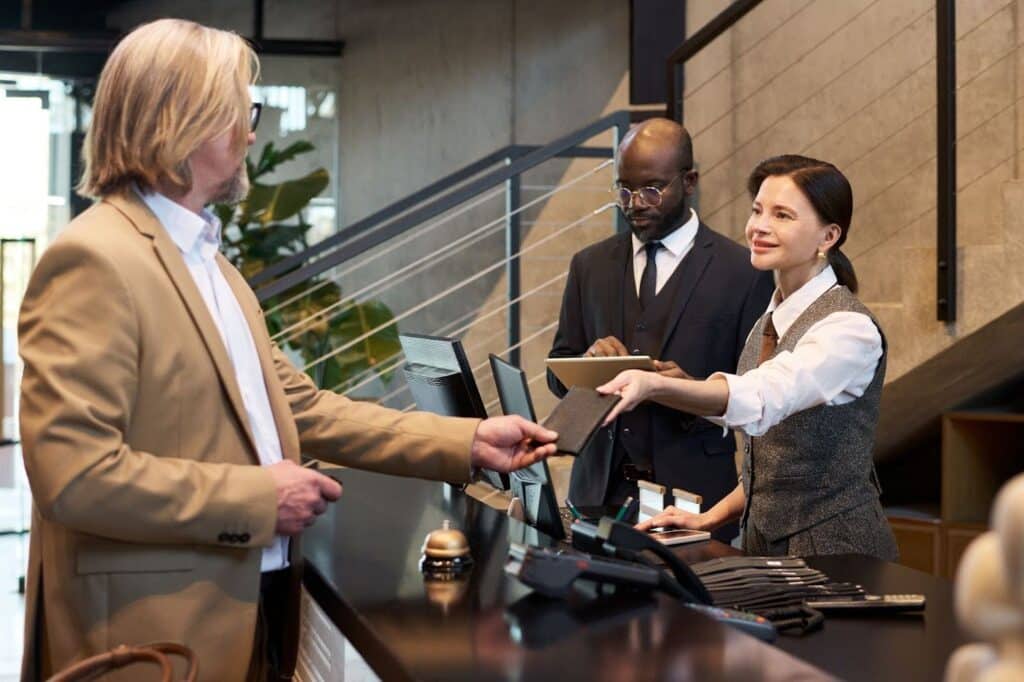
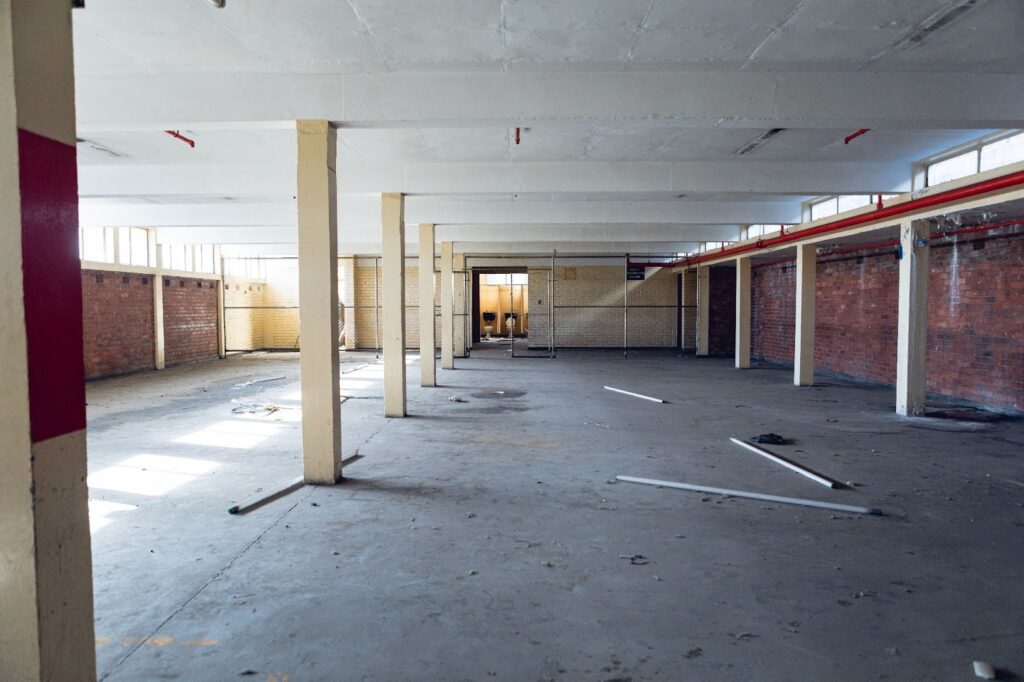
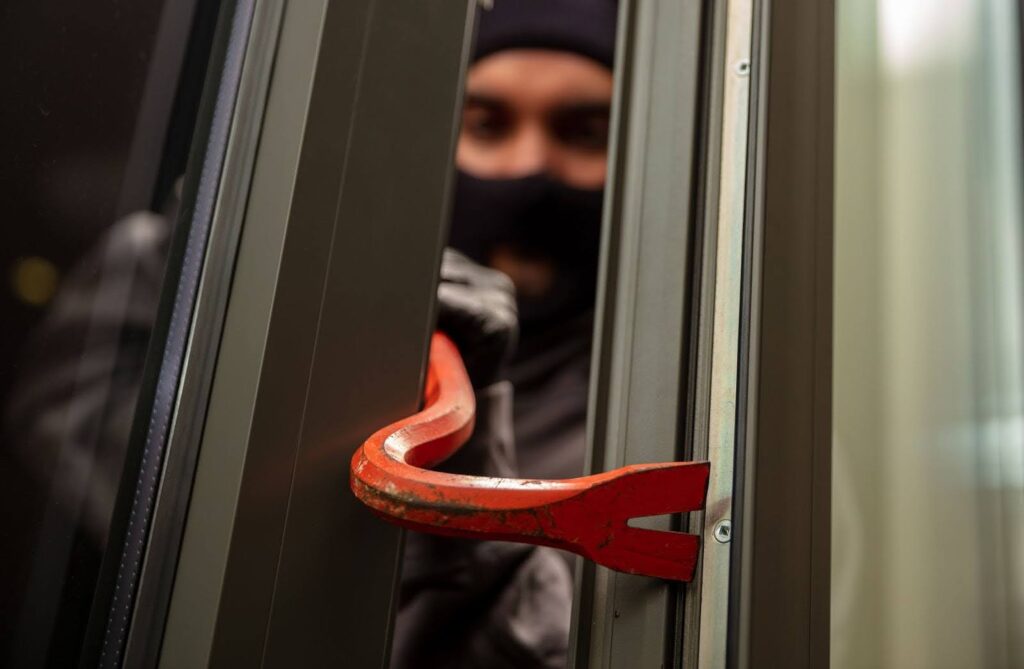
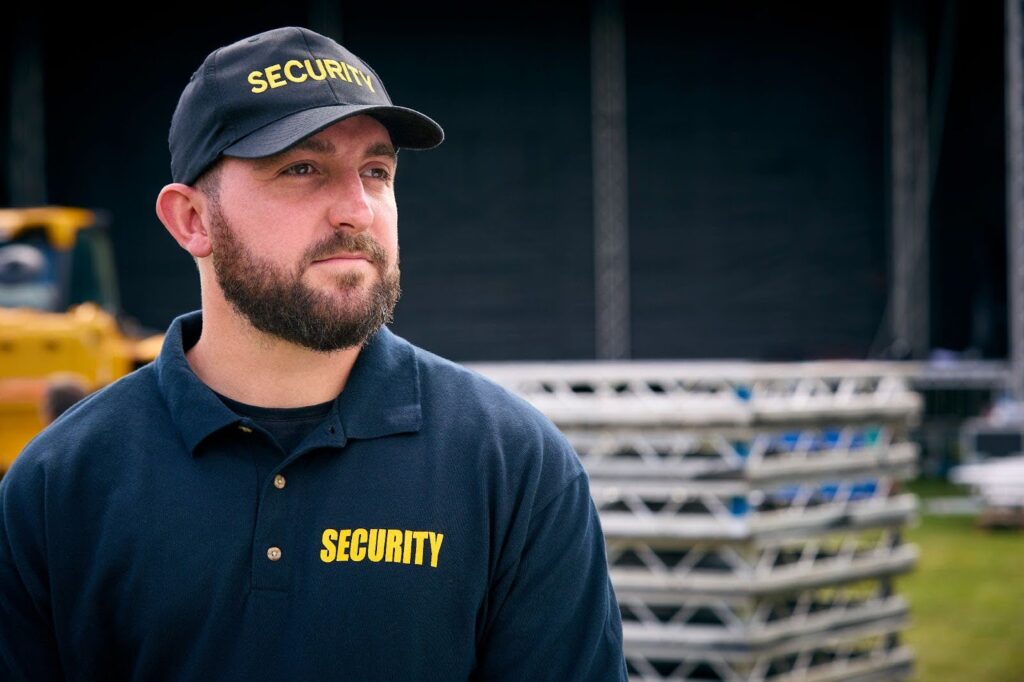
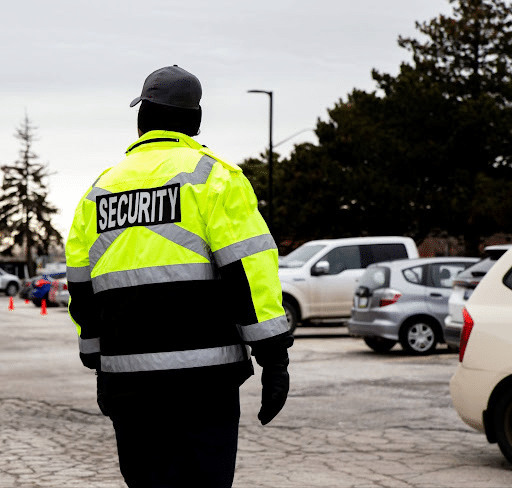
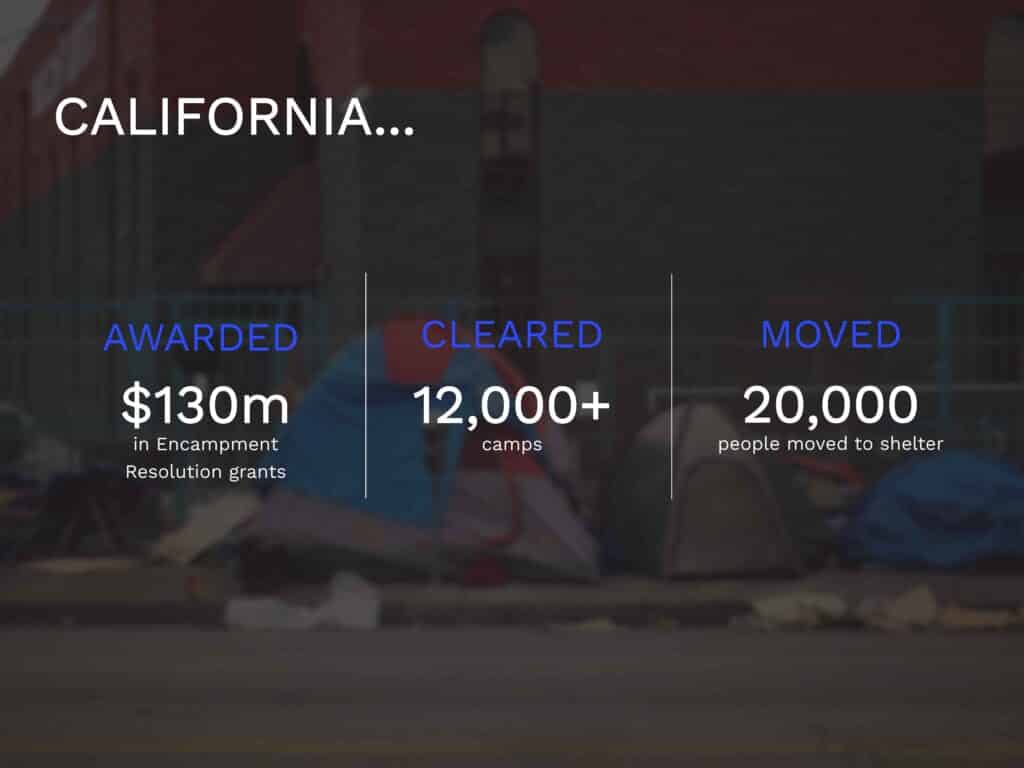 Best practices for businesses:
Best practices for businesses: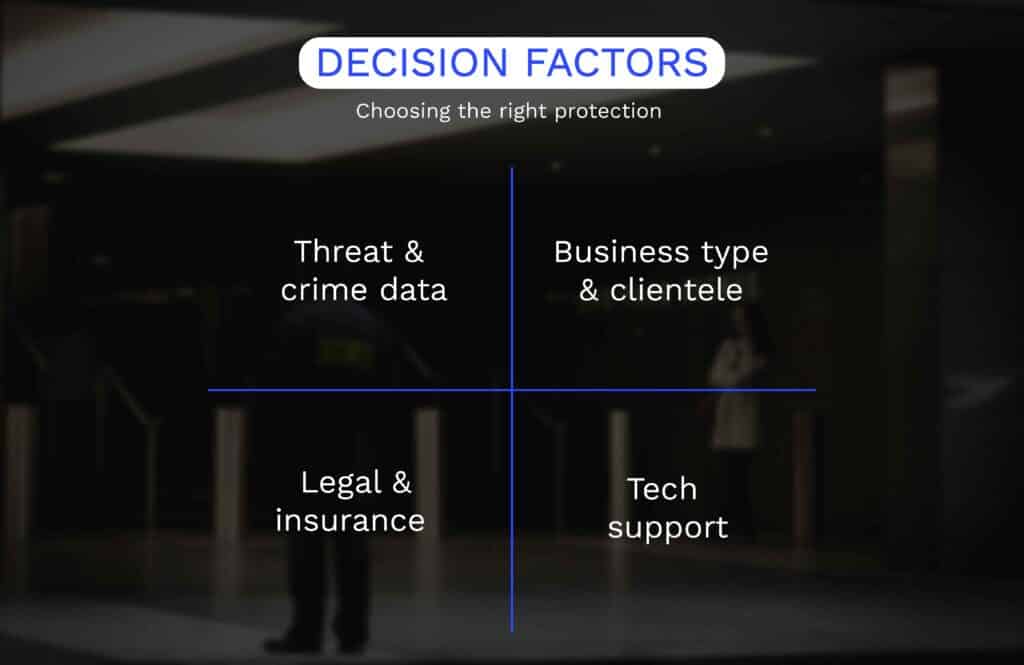 Decision factors:
Decision factors:

